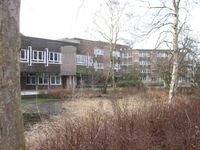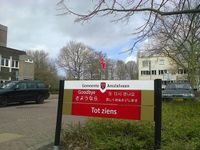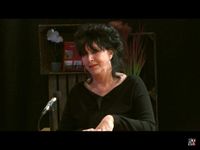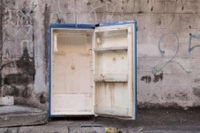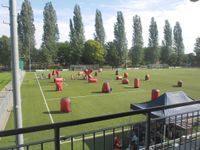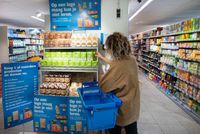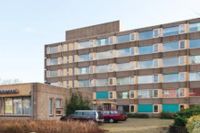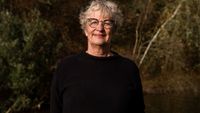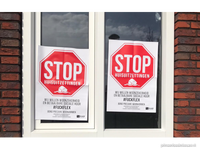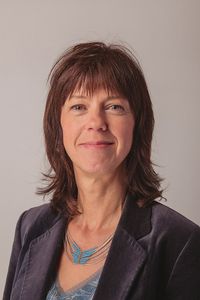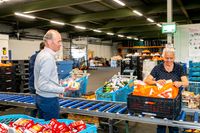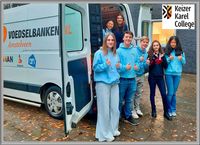News and opinion
Friday, June 28, 2024
Investigation into social housing in Keizer Karelpark
The municipality of Amstelveen is launching an investigation into the construction of social housing on a vacant site in the Keizer Karel Park neighbourhood. On the corner of Appel- and Notenlaan, 30 to 40 units are to be built. The plan is to house (partly) Ukrainian refugees here.
Undeveloped land
According to alderman Floor Gordon (spatial planning), Amstelveen is diligently looking for suitable locations on its own land to realise social housing. This in cooperation with local residents and housing corporations.The location Appellaan/Notenlaan has been vacant for some time. An earlier plan for 11 single-family houses did not go ahead. Due to the high demand for affordable rental housing, Amstelveen now wants to build a complex of thirty to forty small flats of various sizes. Local residents are invited to a walk-in evening to express ideas, wishes and concerns.
Build quickly
Because of the housing shortage, the Platform Amstelveenense Minima hopes that the feasibility study will not have to take too long and that construction can start soon. Especially since there would be single-family houses here, we expect that things like soil, environmental and traffic studies have already been done. See further https://www.amstelveen.nl/.../onderzoek-naar-sociale...
https://maps.app.goo.gl/JPg9fFoRAAWnD28h8
Saturday, 22 June 2024
Twenty thousand euros for 'Not rich, but promising'
The Amstelveen municipality is subsidising the Youth Education Fund's 'Not rich, but promising' programme with twenty thousand euros. This fund aims to give children growing up in poverty equal and maximum development opportunities. In Amstelveen, about ten percent of the children belong to families with a minimum income.
New bicycle or glasses
If it turns out that schoolchildren face a lack of money at home, schools can turn to the Youth Education Fund. In Amstelveen, at least primary school 'De Horizon' and probably three other primary schools will participate in the 2024/2025 school year.
The municipality pays five thousand euros per school while the Youth Education Fund contributes a maximum of seven thousand euros per educational institution. With this money, schools can make requests for individual children, such as the purchase of glasses, a bicycle, a dyslexia test or child coaching. Schools can also make group requests. Examples are a visit to the museum or theatre, a photo workshop, bus transport for a school trip or extra learning materials for the whole class.
The Platform Amstelveen Minima supports this project but wonders whether twenty thousand euros is enough to solve all the acute money problems of Amstelveen children. (Photo: www.dreamordonate.com) For more information, see more (in Dutch): https://www.amstelveen.nl/bestuur-organisatie/persbericht/gemeente-stimuleert-kansengelijkheid-met-subsidie-aan-jeugdeducatiefonds
Friday 31 May 2024
Zaanstad welfare families receive 150 euros a month
In the municipality of Zaanstad (North Holland), 144 welfare families have received their first monthly gift of 150 euros per month. This marked the start of the Kansfonds' multi-year “Just give money” programme. For two years, these households will receive this amount of money monthly, without conditions. The Hogeschool van Amsterdam is studying what this little extra does to the families.
The Kansfonds hopes that this approach will lead to more livelihood security for the participants and a national poverty policy. The Platform Amstelveense Minima would like to see such an approach in Amstelveen too, but the big question is whether the municipal executive committee and the majority of the city council can be persuaded to do so.
Zaanstad first, then Tilburg and Amsterdam
In June 2021, Zaanstad was the first municipality to decide to cooperate with ‘Just give money’. Later, Tilburg and Amsterdam also joined in, which will start implementation later this year. ‘The idea is simple,’ explains programme leader Bas Pieck. ‘We fight poverty with: money and trust.’ Families on welfare will receive 150 euros net per month for two years and get to decide for themselves what to spend that money on. However, implementation is not that simple. It took three years to arrange that the monthly gift would not have adverse consequences for participating families, such as the loss of benefits. ‘We knew it would take time because this is new,’ Pieck said. ‘But that we had to overcome so many bureaucratic hurdles, we did not foresee.’
‘Gift threshold’
Zaanstad (about 161,500 inhabitants) has already set a so-called ‘gift threshold’ of 1,800 euros per year for all residents on welfare benefits. This is to prevent them from having their benefits cut due to donations. Zaanstad has also arranged for participants to keep remission of municipal and water board taxes. Pieck: ‘We have had to switch gears throughout because there is no national, overarching poverty policy. If you give money as a municipality on the one hand, there will be cuts somewhere else because of all the different schemes that affect each other. In addition, we have to comply with AVG regulations. That too requires a lot of coordination.’
Zaanstad's Alderman René Tuijn (Poverty Alleviation and Debt Relief) says: ‘I am happy that the investigation has now started. This extra amount will bring air to families that have been getting one hit after another for years. Think covid, sharply increased inflation and high energy prices. I hope that with this amount from Chance Fund, people will see new opportunities.’
Two research groups
Over the next 2.5 years, the Hogeschool van Amsterdam will study the effects of ‘Just giving money’ on people's health and happiness. ‘Therefore, there is also a comparison group that does not receive 150 euros,’ says researcher Mirre Stallen. ‘The two groups are necessary to really compare the situations of families properly. This is the only way we can measure whether providing extra money makes a difference.’ A draw has determined which residents will and will not receive 150 euros. However, all participants in the study will receive compensation.
Mental and physical well-being
‘Ultimately, we hope to find out whether more financial empowerment and confidence help you get a better grip on your life,’ Stallen continued. ‘In particular, we are looking at the mental and physical well-being of parents and their children.’ In addition, a specialised agency will carry out a social cost-benefit analysis to see what the experiment benefits society compared to current poverty policies. Pieck: ‘In this way, we hope to arrive at a radically different approach to poverty in the Netherlands.’ (Photo: Saketos.nl). See also: https://www.kansfonds.nl/artikelen/zaanse-gezinnen-ontvangen-eerste-maandelijkse-gift-van-150-euro/
Sunday 26 May 2024
Job fair under the canopy
On the initiative of Werkplein AA, part of Amstelveen municipality, some twenty employers held a job fair in front of the town hall on Friday afternoon. This attracted nearly two hundred interested parties who were not deterred by the (drizzle) rain. The key question, of course, is how many people will get a new, permanent job at such an event. That will have to be seen in the coming months during the evaluation.
Although most vacancies these days are offered online, it appears that a physical job fair still has a certain appeal. A cheerfully decorated stall with all sorts of gadgets will continue to do well, even in 2024. After all, many people, including your reporter, simply love free pens, notepads, stickers, stress balls and whatnot. Many of the companies, government and non-profit organisations present had therefore brought these lures in abundance.
An announcement on the municipal websites and some local media resulted in a nice run-up. Alderman Marijn van Ballegooijen (Work and Income) gave a welcome speech, after which the job fair could be ‘stormed’.
Third job fair
“As elsewhere in the Netherlands, companies and organisations here in Amstelveen are desperate for staff," said Eelco Tolsma , head of the Werk & Inkomen department of the Amstelveen municipality. “That is why this job fair is aimed not only at welfare recipients and the unemployed but at anyone looking for a new job.” Tolsma says it is the third time after the corona crisis that Werkplein AA is holding such a physical job fair in Amstelveen and Aalsmeer, and the second time at the town hall.
Police largest employer
As elsewhere in our country, the Amsterdam police, one of the 11 regions in The Netherlands, is looking hard for new staff. Of the 63,000 officers throughout the Netherlands, a significant proportion will retire in the coming years. The Amsterdam force (which includes Amstelveen) will also have to pull out all the stops to fill those shortages in the coming years. But of course, being a police officer does not happen overnight; you first have to go to the police academy. For MBO and HBO students, the police can be an interesting choice, but are people willing to make such a career switch later in life, knowing that they will first have to go to school for several years? Two policewomen from the Amsterdam force did go out of their way to generate interest in the Netherlands' largest employer.
Who speaks French?
Dobbe Transport in Roelofarendsveen (South Holland) is urgently looking for drivers but, to do so, candidates must of course have a large driving licence (C and C1). The transport company also has various office positions, such as transport planner for France but for that, in addition to knowledge of special ICT programmes, candidates must have a command of the French language. And who still speaks good French anno 2024?
In other participants, such as flower auctions, cleaning and taxi companies, the entry requirements are of course lower but so are the salaries. In that respect, it is obviously a bad thing that the coalition agreement of PVV, BBB, NSC and VVD does not increase the legal minimum wage, despite pleas from trade union FNV and the left opposition (SP and GroenLinks/PvdA).
Around 15:30, the job fair was over after 2.5 hours and the weekend could begin. (Photos: Platform Amstelveen Minima)
Thursday 9 May 2024
Keizer Karelpark Amstelveen
A diverse neighbourhood with many activities for minima
According to the official classification, Amstelveen has fourteen neighbourhoods. In terms of inhabitants, over thirteen thousand, ‘Keizer Karel Park’ (including Het Oude Dorp, the old village) is the largest of these.
In this neighbourhood of some 6,600 households, Caron Honold and Floor Kuipers, neighbourhood coaches at Participe Amstelland, work to improve the quality of life and mutual cohesion. Together with the integrated team, they do this by bringing local residents together and developing new activities, also for people with a narrow budget. This happens largely in the MOC (Social Meeting Centre) on Lindenlaan, where the ‘Buurtkamer/KKP’’and Participe work closely together, but also in Kastanjelaan activity centre and several other locations such as Paaskerk and SAKB (art foundation ‘Stichting Amstelveense Kunst Belangen’) on Ouderkerkerlaan. The Platform Amstelveen Minima recently visited Caron Honold at the MOC where she gave a glowing speech about 'her' neighbourhood for over an hour and a half.
Most nationalities
“Keizer Karel Park is a very special neighbourhood,” explains Caron Honold who has both Spanish and German roots. “It is a green but also a very diverse neighbourhood. Ranging from millionaires to minima. So does the housing: villas versus social rented flats. We have the most nationalities here in the whole of Amstelveen. All these people I would like to reach!” Roughly, Keizer Karelpark (including the Old Village) comprises the area between the A9 motorway to the north, Beneluxbaan to the east and south and Bovenkerkweg and ‘De Poel’ (The Pool, the large midcity pont) to the west.
Network function
Honold continues: “As a neighbourhood coaches, we have been able to build up a broad network in Keizer Karelpark in recent years. This is also necessary to bring local residents into contact with each other. We encourage them to develop ideas for new activities, such as courses or meetings, but also try to get things off the ground ourselves, also for people with little money. Many of our activities are free or almost free. We also have giveaways, share tables and cupboards with free books. But an important part of the work is to get in touch with local residents who are struggling and help them on their way as best we can. Caron hastens to mention, by the way, that she and Floor do not do all this alone. “We work within a close-knit, well-attuned integral team. That consists of a social worker, social management, elderly workers and an activity coach.”
Giveaways
In the giveaway cupboard in the MOC, local residents with little money can get free menstrual products and other perishable food items such as rice and macaroni. From the bookcase, they may take a copy or exchange a book without further obligation. Thanks to cooperation with the neighbouring supermarket, there is a regular supply of new products.
Caron Honold enthusiastically talks about the many activities in her neighbourhood. Both in the MOC and on Kastanjelaan and the other locations. “Actually, it is impractical to list everything, I would be busy for days! But every working day there are various courses, meetings and other activities. Let me add right away that we could not offer all these activities without our dozens of volunteers. They also ensure that we can offer many courses and meetings for free or almost free.”
Homework help
She continues: “Every Monday from 3.30 pm to 5 pm, there is free homework help at the MOC for primary school pupils in group seven and eight, led by former teacher Huub Philippens. These pupils get help from some 15 retired teachers.” Also worth mentioning, according to the district coach, are the free drama classes for children, language courses and Yoga meditation classes. On Thursday mornings, a games morning is standard.
Every morning from 9 am to 12 pm, local residents can meet at the MOC, while enjoying free coffee and tea. Through cooperation with Ateliers 2005 and SAKB, there are various opportunities to draw, paint and practice other forms of visual art.
On the initiative of local resident Lonneke Bikker, there is ‘Lonneke’s Living Room’ in the MOC every Friday morning. Intended for anyone who has been affected by cancer themselves or those close to them. Various sports clubs are active in the Kastanjelaan, such as a shuffleboard club, a course ball club and several card clubs. This location also hosts regular lectures and films.
Free consultation hours
“And then we have the free consultation hours,” Caron continues enthusiastically. She is thinking of the socio-legal counter on Thursday evenings from 19-21 hrs. The Financial Café also holds sessions once a week, on Wednesday evenings from 19-21 hrs, at the MOC to help local residents with issues such as tax assessments, benefits or debts. Recently, the thousandth visitor registered. On Wednesday mornings, an employee of AA Werkplein, part of Amstelveen municipality, gives tips and advice on applying for a job and looking for paid work. New is a consultation hour by dieticians.
Newsletter indispensable
Caron, who calls herself a social worker at heart, points out the importance of the monthly newsletter. “This is an important communication platform for the neighbourhood. In it, everyone can announce new developments and activities or place calls. All organisations in the neighbourhood have a place in it. We are now approaching the thousandth subscriber, not bad out of a population of thirteen thousand! Although of course I hope that the whole of Keizer Karelpark will receive it and actively use it, so that the neighbourhood will become even more involved with each other,” concludes the enthusiastic neighbourhood coach.
If you would like to know more about the activities in Keizer Karelpark, please contact Caron Honold. Tel. 06 - 235 373 89, e-mail c.honold@participe.nu. See further websites https://keizerkarelpark.com and https://www.participe-amstelland.nu/keizer-karelpark. (Photo caption: Caron Honold at the giveaway cabinet in the MOC. Photo: Platform Amstelveen Minima)
Wednesday 17 April 2024
Theme night in ‘De Meent’ community centre
Debt restructuring does not reach majority of Amstelveen residents
On the initiative of the political party ‘ChristenUnie’, a fortnight ago - Tuesday 2 April - there was a discussion evening on debt restructuring in Amstelveen. Despite the fact that there are several parties dealing with this tricky subject, it appears that neither the Amstelveen municipality nor social organizations and political parties manage to reach all households with problematic debts. In short, there is still a lot of work to be done, ‘De Meent’ community centre revealed.
Amstelveen is a municipality of extremes. On the one hand, some three thousand millionaires out of a population of 95,000 souls live there, but there are also an estimated three thousand households, out of a total of 45,000, with problematic debts. “Of these, we have been helping an average of 450 to 500 households a year in recent years,” says Paul van Welzenis, team leader of the Amstelveen municipal debt relief department. “The new inflow is about 300 people a year, the vast majority of whom we deal with.”
So that is only a fraction of the approximately three thousand households, about seven per cent of the total, with problematic debts. The key question in ‘De Meent’ was how the municipality of Amstelveen but also political parties and non-profit organisations like ‘Het Financieel Café’ (The Financial Café), a partnership of Participe Amstelland and Humanitas Amstelland at various locations in Amstelveen, and ‘SchuldHulpMaatje’ - present in Amstelveen since 2023 - can lend a helping hand.
Using seven propositions, five representatives of these organisations entered into a discussion in front of some 30 interested people. The panellists were Henk Jurriansen, coordinator of ‘Het Financieel Café’ in Amstelveen, Paul van Welzenis (team leader debt assistance), Lars Grijsen, board member of ‘SchuldHulpMaatje’ Amstelveen, councillor Sandra van Engelen of political party Christian Democrats (CDA) and Dianne Hoefakker, citizen councillor of ‘ChristenUnie’ (ChristianUnion). They discussed under the leadership of social councillor Samany Bruynder, also a member of ‘ChristenUnie’ in Amstelveen.
Shame
A key word that kept recurring this evening was shame. According to several panellists, this phenomenon plays an important role in the reluctance people feel to turn to municipal institutions or social organisations for help. Sandra van Engelen: “Anyone can face problematic debts: think about divorce, job loss, death of the partner, bankruptcy or whatever.” Something that Henk Jurriansen recognises like no other. “People are often ashamed to tell third parties about their financial problems, even at a low-threshold institution like the Financial Café. Our clients often come in with excuses like: I need a payment arrangement for a bill I can't pay. When we then ask a few more questions, it turns out there are numerous debts. Sometimes not only with companies and government bodies but also in the informal circuit. Five thousand euros with a sister or friend, it all adds up!”
The Financial Café does not do debt restructuring itself but refers people to municipal departments such as ‘Balans’ or the Social Services Desk. Jurriansen: “We usually do such a referral in the presence of the client. Because otherwise, unfortunately, it happens too often that people don’t take this necessary step!”
Approachable
According to Paul van Welzenis, his department tries to keep the threshold for application as low as possible. “People don’t have to bring bank statements or other documents the first time. Only later, when we start working with the debts, is it of course necessary for us to have the necessary financial data.”
Since 2021, parties such as energy companies and housing associations have been obliged to report arrears to municipalities. In 2022, this involved almost two thousand reports in Amstelveen. Van Welzenis: “As part of early signalling, we visit residents with problematic debts. This involves some thirty to forty home visits a week. This method works better than sending a letter because we know from experience that these are often not opened and end up in a big pile. If people are not at home, we leave leaflets or call later.”
Yet things do not always go well by a long shot, an employee of the ‘Voedselbank’ (Food Bank) Amstelveen revealed. For example, this non-profit organisation wonders why the Amstelveen municipality's tax department does not pass on signals when residents are unable to pay their local taxes and levies, and why no covenant has been concluded in this regard.
In Amstelveen, by the way, the average debt among people with problematic debts is about 40,000 euros per household, spread across 14 creditors.
Not digitally literate
Lars Grijsen of ‘SchuldHulpMaatje’ thinks it’s important that there should be space to listen to people at length. “A listening ear is very important. People need to feel that we take them seriously and want to help.” Words that Dianne Hoefakker, Sandra van Engelen and Henk Jurriansen also agree with.
The latter identifies another problem. “Society has become increasingly complicated and that also applies to financial problems and debt assistance. Almost everything has to be done digitally these days. But politicians and implementing agencies often forget that 2.5 million Dutch people are low-literate and about half of the population cannot keep up well in our society.”
One of the statements was about young people under 27, a special target group in debt restructuring. It is increasingly common for young people to get into financial trouble, for example due to gambling debts or thoughtless purchases. This also applies to Amstelveen.
Almost all attendees agreed that this target group needs a special approach. In 2023, the Amstelveen municipality launched the pilot project Youth in Amstelveen Debt-Free (‘Jongeren Amstelveen Schuldenvrij’, JAS), in which around 10 young people have so far participated. The panellists felt more needs to be done for this target group up to 27 years old. Jurriansen: “Unfortunately, schools are usually not interested and refer parents, which threatens to put young people between two stools.” CU councillor Henk Schoffels, who did the closing ceremony, wondered if we as a society ‘should not teach children to handle money much earlier’.
Flaws
Despite all the good intentions, the theme evening showed, according to all involved, that there are quite a few ‘flaws’ in the current regulations. Everyone also agreed that municipal debt restructuring requires the necessary aftercare. Jurriansen: “The current term for debt restructuring lasts 18 months but what happens after that? I am especially worried about the minor children.”
Paul van Welzenis also indicates that aftercare is important. “t is important to keep a finger on the pulse even after the client’s rehabilitation process is over. So that people remain permanently out of debt.” According to Dianne Hoefakker, it is also important that we as a society care more about people who can no longer make ends meet. “Neighbourliness is called that with a fancy word these days. Ask how someone is doing, see what you can do for an elderly person or neighbour.”
Photo caption: The panel during the information evening. From left to right: Samany Brunder, Sandra van Engelen, Henk Jurriansen, Paul van Welzenis and Dianne Hoefakker. Photo: Platform Amstelveen Minima.
Sunday 7 April 2024
Mini Blog - The cigar out of its own box
It was allowed to cost a bit to bring about the human measure at ' Werkplein' in Amstelveen. The amount of € 300,000 of which was money from the welfare pot for reintegration, the money that was meant for you say is a huge human touch. The Werkplein can be placed in the Dutch style magazine 'VT Wonen' with immediate effect. We were already wondering why there is no annex of the Werkplein at the Woonboulevard.
The alderman for work and income says an application for social assistance no longer needs to be applied for at an open counter. The wealthy Amstelveen municipality has completely rebuilt the town hall.
The Werkplein last, from another pot of money, your own money for training.
Very special also that in rebuilding 1 of the town hall, the Amstelveen counter, has now been renamed human, namely the Social Counter.
If you now think, as the press release says, that you think you can apply for assistance at the Werkplein housing estate, that is not correct.
No, because you are not allowed to go there at all to apply for assistance.
The first application for assistance is still at the open desk of the Social Counter (Amstelveenloket). (You still have to go to this counter to get a link to apply for assistance at all).
Customisation looks slightly different at the pimped-up Social Counter, namely no privacy, nothing. Applying for mini-grants? Not at the Werkplein with your welfare benefit. And officials are left scratching their heads as to why people on minimum income still do not come to the municipality.
The Human Dimension appears to be a project through which we noticeably improve our services and communication, according to the alderman.
As a welfare recipient, I would still have liked to be told that I can follow a training course instead of being forcibly referred to Matchez. The commercial reintegration company that is still telling people that the shortest way to work is as a cleaner or stock boy.
We, the platform, still speak to welfare recipients from time to time. The customer managers who still preach the mantra to welfare recipients that people should bring their own interpreter. And indicating that there is no money for training is less humane than the counter 'Scandinavian living' suggests.
And the finishing touch, not an unimportant detail on the stylishly designed Werkplein is the absence of the brochure cabinet.
Inferior stylist Lisa- Lotte was not allowed to include the brochure cabinet in the floor plan. A nice green-tinted Scandinavian cabinet is missing.
Removing the brochure cabinet altogether didn't dare the human-size project manager. It's just barely in the basement. Search well and you might find it (see photo).
With a human wink,
Platform Amstelveen Minima
Friday, April 5 2024
Information evening political party ChristianUnion
Key question: how do we reach every Amstelveen resident entitled to debt restructuring?
On the initiative of the political party 'ChristianUnion', Amstelveen department, an information and discussion evening on debt restructuring and debt relief in our municipality took place on Tuesday 2 April. In community centre De Meent, (civil) councillors Dianne Hoefakker (ChristenUnion) and Sandra van Engelen (CDA, Christian Democrats) discussed the state of affairs and possible improvements together with three experts. These three experts were Henk Jurriaansen, coordinator of The Financial Café (Humanitas/Amstelland), Paul van Welzenis, team leader debt assistance of the municipality of Amstelveen, and Lars Grijssen ('Schuldhulpmaatje'). Discussion leader was Samany Bruynder, social councillor in Amsterdam and group member of ChristianUnion Amstelveen.
The main conclusion of the evening, in which the 20-strong audience actively participated in the discussion, was that some 450 to 500 people in Amstelveen are helped with debt relief every year. But also that this is only a fraction of the approximately three thousand Amstelveen residents with financial problems who are eligible for municipal debt assistance and restructuring. The key question is: how do we reach all these people? Lack of adequate information plays a role here but certainly also shame.
In a few days, we will post an extensive report on this interesting meeting. (Photo: Bart Stam/Platform Amstelveen Minima).
Thursday, April 4, 2024
Water board 'Waternet' puts Amstelveen minima in trouble
Due to problems with a new computer system, water board 'Waternet' could not send the residents of the 'Gooi, Vechtstreek and Amstelland' water board bills for the 2022 and 2023 water taxes. Amstelland also includes the municipality of Amstelveen and its neighbouring municipalities.
This means that even Amstelveen's minima, if they do not receive a waiver, will receive all the assessments for 2022, 2023 and 2024 at once. Naturally, this leads to great unrest among our target group who have to turn over every euro in these expensive, uncertain times.
Website NH News wrote a large article on Wednesday 3 April about this affair. Besides some affected residents, the Platform Amstelveenense Minima also featured extensively. Below is the full article on NH Nieuws's website, see also (in Dutch): https://www.nhnieuws.nl/nieuws/334181/driedubbele-aanslag-van-waternet-kom-in-de-problemen-als-ik-het-in-een-keer-moet-betalen?fbclid=IwAR0jM-Ul9dSqy4o41s-hsy3uhhsfwMwufskmeVZO00jNhNFp9LTHPgcyTzA_aem_Aah-tjd5QgnoWKeiuSqjWDxRd75M3TuI1brmIOjfqOuPwFzbj941R-0H-r96JNrG34WHRYoazOa7iuYrhvIlCoSN
-----------------------------------------------------------------------------------------------------
Triple assessment from Waternet
"Get in trouble if I have to pay it in one go"
Vulnerable residents from Amsterdam, Gooi, Vechtstreek and Amstelland are getting into financial trouble because this year they have to pay no less than three consecutive years - 2022, 2023 and 2024 - in water taxes. Waternet says it is looking for suitable solutions as much as possible, including a "generous waiver".
The amount of water board tax varies per situation, but can amount to hundreds of euros per year. Normally, residents pay this water board tax once a year, but due to a new ICT system in 2020, tax assessments could not be sent for years.
These overdue assessments must still be paid. The total value of the assessments from these three consecutive years is €511 million. Waternet, the executive organisation of Water board 'Waterschap Amstel, Gooi and De Vechtstreek', is currently in the process of sending the assessments for 2022 and 2023. Residents can expect the assessments for these tax years after the summer.
Government confidence
The successive tax assessments weigh heavily on financially vulnerable residents, notes mrs. Wil Roode of the Platform Amstelveen-minima, an informative website for this target group. Around her, she sees that many people are afraid to ask for help. "They don't trust the government. Moreover, all kinds of things have to be supplied to get help. That requires a lot of organisational skills."
"We understand that this is very annoying and apologise," says the spokesperson for Waterschap Amstel, Gooi en Vecht. "We are trying to find a suitable solution. If residents or companies have payment problems, payment arrangements are possible. We have also opted for the most generous waiver policy possible within the legislation."
"It seems like little money to some people, but not to me," says Mark Gisbertz, a financially vulnerable resident of Uithoorn, neighbouring municipality of Amstelveen. He has to make ends meet on his 'Wajong' benefit and income from his six-hour job as a mail delivery driver. "If I pay it all at once, I will run into trouble," he said. Mark received the 2022 and 2023 assessments earlier this year. For weeks, he sent Waternet angry messages with cries for help. "It is unacceptable that people have to go on their bare knees to get a solution," he said.
Discussions with Waternet have revealed that Mark Gisbertz will not get a waiver because he runs mail six hours a week. He has to pay in twelve instalments, as opposed to the eight instalments Waternet previously proposed. Mark will not be allowed to start 2023 payments until all 2022 instalments are paid.
Duped
"Mark has been extra duped," argues Wil Roode. "Because he works a few hours - which his benefits already leave him with very little to do - he will not get a waiver." The same applies to single parents who are denied remission because of children living at home with too much savings, she says. "Waternet sees a payment scheme as an appropriate solution but many residents cannot have a scheme at all," Roode says. "For some, this even means going into debt restructuring, simply because they can't pay it."
Mark additionally mentions it is resented that in the meantime, Waternet did not send residents a letter or inform them personally that the assessments would be settled later. As a result, some residents did not take the assessments into account and set money aside, he argues. "They make a mess of it and we are left in it," he says.
Tuesday 26 March 2024
Discussion evening on debt assistance Tuesday 2 April
Political party 'ChristenUnie', department Amstelveen, will hold a discussion evening on debt assistance on Tuesday 2 April. This will take place in cooperation with political party CDA Amstelveen, 'Schuldhulpmaatje Amstelveen', 'Humanitas/Financial Café' and the municipal department Balans. Location is community centre De Meent Orion 3 in Amstelveen. The meeting starts at 8 pm and will last until around 9.30 pm.
Using propositions, a panel will discuss local debt relief in Amstelveen. These experts will come from the above-mentioned parties. At least present will be citizen councillors Sandra van Engelen (CDA) and Dianne Hoefakker (ChristenUnie). Those present in the room can ask questions to the panellists. Discussion leader is Bert de Pijper, former ChristenUnie city councillor.
Theses
With this evening, ChristenUnie wants to take the initiative to discuss debt relief in Amstelveen. Using propositions, the Christian political party wants to start a discussion about the quality of local debt assistance.
Questions and propositions that may be raised include: should there be a direct relationship between debt assistance and poverty reduction, and how can we shape this? How can we prevent people from defaulting on their debts? What preventive measures are there? How can we apply customisation in debt assistance? What can the government and private organisations contribute to people's healthy financial management? What improvements are possible in debt assistance in the municipality of Amstelveen?
You can register for this information evening by e-mail at info@amstelveen.christenunie.nl or by phone (06-20 24 36 54). See also (in Dutch): https://amstelveen.christenunie.nl/k/n452/news/view/1494218/300566/christenunie-organiseert-gespreksavond-schuldhulpverlening-op-2-april.html.
Friday, March 22, 2024
Visiting the Energy Coach
“There's a hundred euros waiting for you for electric cooking. You can pick it up in no time!”
It is becoming increasingly complicated for a normal person to keep up with all the developments in the energy field. This certainly applies to Amstelveen's minima. Energy surcharges, the Emergency Energy Fund, alderman Floor Gordon's controversial white goods campaign, you name it! Schemes seem to change faster than Ajax of trainers and board members. Quite apart from the fact that there are also plenty of subsidy pots for small and medium-sized enterprises (SMEs), VvEs (Owners' Associations), community organization and private landlords. The big difference between the two 'parties' - entrepreneurs and wealthy private landlords on the one hand, low-income tenants on the other - we will elaborate in some follow-up articles.
Ten energy coaches
However, some ten energy coaches have been running around Amstelveen since November 2023, employed by the municipality’s Regional Energy Desk. They give both homeowners and tenants free energy advice on Friday afternoons. Useful for households who have to turn over every euro. By the way, energy coaches have a different function from energy fixers who actually get to work on home insulation, for example. Energy coaches also visit people's homes but only to give tips and draw up an action plan.
The two editors of the Platform Amstelveenense Minima set out to find out what Amstelveen residents on a narrow budget could gain from such an energy coach. She with an owner-occupied house bought in the 1980s, he with a social rented house (built in 2010). An atmospheric report.
Where is our energy coach?
At 2 p.m., on a Friday afternoon in March, our energy coach is already patiently waiting for 'customers'. A walk-in clinic without an appointment, on the first floor of Amstelland Library on Stadsplein. Despite the advertising banners, it is not immediately clear to your reporters who is going to help us get rid of our excess cubic metres of natural gas and kilowatt hours this afternoon. But after some detective work, we catch sight of the energy coach.
A friendly, bespectacled man gives us a warm welcome. It turns out to be Maarten Schneider. He has been Amstelveen's climate mayor for several years and is one of the dozen or so volunteers the Municipality of Amstelveen’s Regional Energy Desk deploys to answer questions from tenants and homeowners. The consultation hour at the library is his idea.
Soon after we explain our energy situation at home, Maarten subjects us to a barrage of pointed questions: “Do you have LED lamps everywhere in your house? Please do, because that saves a lot on the electricity bill compared to energy-saving bulbs and light bulbs!” “Do you cook on natural gas or do you have a ceramic or induction hob? With the latter, you can pick up a hundred euro subsidy in no time.”
“Do you shower very long?”
One of us lives in a rented house that Eigen Haard had built in 2010, as part of new construction project Boven-Oost. The resident is proud that he and partner ‘only’ use about 650 cubic metres of natural gas a year but our energy coach sees it differently. “I actually find that quite a lot for such a new, probably well-insulated house,” says Maarten Schneider. “Do you have the heating on very high or do you shower very long?,” he allows himself a joke. After the negative answer, the energy coach says. “I would actually expect your annual natural gas consumption would not exceed 200-250 cubic metres.” The explanation that the central heating system in the attic, a high-efficiency boiler combined with an electric heat pump, is almost 14 years old cannot really convince him. "I think there are still gains to be made."
A P1 meter, what the hell is that?
We shift our attention to electricity consumption, some 3,600 kilowatt hours (kWh) per year in recent years. In the early years, thanks in part to the electric heat pump driving the underfloor heating, we were above four thousand kWh a year. But we have since been able to reduce this consumption somewhat by buying new, energy-efficient white goods. Here, according to Maarten Schneider, there is still something to be gained. “OK, so you have Led lamps but do you also have a timer for the electric heat pump?” And where do we put it? “Between the plug in socket and the heat pump itself.” Then we just need to figure out where exactly that heat pump is located. But that's another useful tip!
“Do you have a smart meter?”, our energy coach continues. Yes, we do. “Then it would be good to buy a P1 meter.” Now what is that? “Such a P1 meter allows you, via your mobile phone or tablet app, to keep a close eye on your current energy use and adjust it accordingly.”
Collective plans
The initiator of the Platform Amstelveen Minima has some more general but very burning questions. “Is or will there be a collective plan in Amstelveen for residents of social housing to promote electric cooking via ceramic or induction plates?" To that, unfortunately, our energy coach must hold the answer. “This question I think you should ask Eigen Haard,” he says.
Since they are many contacts with people on a narrow budget in social housing, they would like to know what possibilities there are in Amstelveen for making these accommodations more sustainable. This is because the housing association does not usually go too fast in this area. She: “Many people with a minimum income often live in older houses or housing complexes where the insulation is very poor and the heating costs are therefore very high. Especially for those who have a corner flat on the top floor, for example. Do these kinds of flats actually have cavity wall insulation?”
Our energy coach doesn't dare say. “That depends on the year of construction. I do know that from 1985, all new-build houses, including flats, are required by the Building Decree to have cavity wall insulation.”
From recent research of flat residents in Ambrosiuslaan in Amstelveen, tenants of Eigen Haard, we know that many flats have double gas but from, so to speak, the stone age. “You could consider installing a front window,” said our interlocutor. But then again, who should do that? If the housing association won't do it, it will be a costly joke for residents. For all our questions on cooling and heating, the volunteer refers to the website https://www.amstelveen.nl/duurzaam.
Pausing for a moment...
Meanwhile, since starting on 3 November, the energy coaches have helped around 50 Amstelveen households with energy advice during their weekly sessions on Fridays. From 1 April, however, these sessions stop temporarily, to restart in autumn. The home visits, for which people can make an appointment via the Regional Energy Desk, will continue during this period.
We say goodbye and thank the energy coach for his help. Finally, he has a little gift with him: an energy-efficient shower knob. This will be installed the same evening...For more information, see https://regionaalenergieloket.nl/amstelveen
(Photo caption: Councillor Floor Gordon and Maarten Schneider during the start of the 'energy consultation' on 3 November).
Friday, March 1, 2024
The housing crisis in Amstelveen and Amsterdam: a personal account
At the request of the Platform Amstelveen Minima, Anouk Beynon (35) put down on paper her years-long, seemingly endless search for a social rental house. Read below her 16-year battle against overdue maintenance and unreliable landlords. Fortunately, her long struggle was rewarded about six months ago with a beautiful appartment in Amsterdam’s popular De Pijp neighbourhood.
Anouk Beynon
It is early February 2024. I emptied my storage loft in Aalsmeer (a suburb of Amsterdam) today. I finally moved the last things from my previous house to my new home in ‘De Pijp’, a popular district in Amsterdam. Twenty moving boxes, a wardrobe, a sideboard and twenty vacuum-packed bags of clothes. I now understand why I didn’t do it sooner. After all, I was just on the verge of a mental breakdown.
Black mould
I don’t know if you have ever smelt the smell of black mould? It is the smell of poverty. The smell you smell when you enter the neighbour’s property because the neighbour is collecting old stuff from the street and doesn’t have enough money to turn on the heating. Even the reek that hangs around him I recognise from thousands. It takes me back to my childhood: the poorly insulated house I grew up in, where mould was everywhere in the cupboards. Disconnected by the energy supplier in winter because yet another bill hadn’t been paid. That I was bullied at school because my clothes stank. That smell, unmistakable and something I had sworn I never wanted to live in again.
Rotting mushroom
Due to the housing shortage, a lot of people are living in small and poorly ventilated rooms of 15 square metres on average. Often with only one window and no ventilation (or one that doesn’t work). The residents cook, shower, sleep and have sex in the same room, causing all these odours to spread and mix into an odour of a smelly, rotting mushroom. Since there is no ventilation, the air lingers everywhere.
I lived in an old retirement home in Amstelveen until October 2023. When you walked in, you immediately smelt the black mould: a pungent smell that is everywhere in old social housing buildings or people of the low class. Extremely bad for your health and lungs.
I suffered from coughing every day and at night I often couldn't get any air. This even though I actually had the window open almost all the time. Dutch Central Bureau of Statistics (CBS) figures show that people on low wages and benefits live six years shorter on average. Apart from having to wait 15 years for social housing, you will probably end up in a slum when it is your turn.
Landlords, housing associations, social rent or free sector, all are the same. Minimum investment, maximum output. I am in a political party and recently took part in a campaign to help people who have extreme black mould in their homes. I visited these people in Amsterdam district ‘De Bijlmer’. Some were crying because they have been running into a closed door at the housing associations for years. They get painted once but because of the poorly insulated damp and old houses, often with poor ventilation systems, the mould returns within two weeks. It’s all over the walls. Apart from the fact that there are often other defects that nothing is done about.
My own experiences
Now I will start at the beginning to tell you about my living experiences since I went out on my own. When I was 17 years old, I was kicked out of the house by my mother. She was severely depressed by her divorce and could not have me around. She said it was time for me to fend for myself. She said she herself had also left home young and that it had been fine.
I grabbed two big Samsonite suitcases and walked to the station in Purmerend (North Holland, The Netherlands). There, my best friend Awatif was waiting for me. She locked me in her arms and took me to her house in Amsterdam-West. My dear friend had a mattress for me in the living room. It was small, filthy, cockroaches walked across the floor at night next to my head, I could hear the ticking. If you opened a kitchen cabinet, swarms jumped out. But it was paradise for us, freedom! And we had the time of our lives in those 15 square metres. During this period, I was in hotel school. Up at 5 a.m. every morning, serving 6 a.m. breakfast at The Grand.
I took the next step after two years and went to live with my then boyfriend in Spain. I ended up living and working there for a year. Because you cannot get a scholarship in Spain, and studying costs around ten thousand euros a year, there was no future prospect for me. I worked in a clothes shop (Zara) with no opportunities for advancement.
I always wanted to do something with fashion, so I went back to the Netherlands to study fashion design at the AMFI (Amsterdam Fashion Institute). I was forced to live with my mother again. The situation had worsened: piles of papers a metre high were everywhere: injunctions from bailiffs and assessments from the Dutch Tax Office. My parents were in a fighting divorce over the house. A few days later, there was a letter on the doormat: foreclosure sale. That was the moment I registered on the website of ‘Woningnet’, the platform for social housing. I remember it like yesterday, I was nineteen.
‘Woningnet’
Woningnet lists all social housing in the Amsterdam city region: Ymere, Lieven de Key, Eigen Haard, Rochdale, you name it. To register for this region, you had to have ties. This means you had to have been born there or demonstrably registered for a long time. I remember how happy I was when I registered, and how much hope I had. A house of my own! Finally no more misery from home, living comfortably in my hometown of Amsterdam where I felt most at home. On to independence. I was ready for it.
I looked expectantly at ‘Woningnet’ every week and was the first to respond to a house in the Westerpark neighbourhood. So naive then, and completely unaware of the fact that I would not be allocated a house for the next 15 years. Not knowing that a major housing crisis was coming.
Main tenant
After living with my ex-boyfriend for a while in a terraced house in Purmerend, I decided to move to Amsterdam after the relationship broke up. The landlord was the uncle of a friend of my former partner. He owned a whole building in Amsterdam, from ground to fourth floor. The entire second floor became vacant because a cannabis coop had been rolled up here. The landlord decided to rent the floor to students, and I had just been accepted at AMFI around the corner. There were three rooms - but no living room -, a small bathroom and a kitchen. I became the main tenant and was allowed to pick two roommates. Furthermore, I was responsible for a new roommate if an old one left. Marloes, my friend from the academy, came to live in the other room. We paid 450 euros rent.
I had a nice room of twenty square metres, a marble floor with marble fireplace and French balcony at the front. I had the time of my life here, it was great living and I got to know Amsterdam really well! This despite all the flaws in the house (the kitchen floor was completely loose, the shower often didn’t work and there was no fire escape).
Because the landlord was a classic slumlord, he had made me sign a form from the tax office for the rent allowance (to which I was entitled as the main tenant), and put his own account number on it for the payouts. He had done the same with the studios above us. Besides, we had no rental contract.
Airbnb
When I graduated, I decided to travel. At that time, the platform Airbnb was just launched. I was abroad a lot and rented out my room on Airbnb. At one point, I found a letter in the letterbox from the landlord. It was a summons; he had found my Airbnb profile online and was suing me. He wanted all the income I had earned from the room.
Through my work, I had met a talented lawyer who had just graduated. He took my case as one of his first cases. And I was vindicated by the judge. I did not have to repay the income because there were an awful lot of defects in the apartment. The lack of a fire escape was the deciding factor. This is required by law, otherwise you can’t rent out rooms.
I then proposed to leave. This was because the landlord lived in the same building on the ground floor and kept knocking on the door. However, with the condition that I was given a buy-out payment with it, which I was also awarded by the court.
As I didn't have another room, and the housing shortage was a fact by then, I went to live with a friend in a basement on the corner Prinsengracht-Westerstraat, in the centre of Amsterdam. Together on twenty square metres. Because it was too small, and we were going crazy for each other, we moved briefly to a slightly larger flat but this didn’t work either. I was always dependent on others, always living together and hadn’t had my own place for ten years. I desperately needed a place to unwind without roommates.
Old retirement home
Then the next crisis chapter dawned. What seemed like a fairy tale at the beginning. A sound engineer I had met in Amsterdam said it would be good for me to swap the busy city for a quieter place for a while. A studio became available in an old retirement home where he himself lived, ‘De Olmenhof’ in Amstelveen. A good word was put in for me and that’s how I ended up in Amstelveen. I got a 22 square metres for five hundred euros, under the Empty Homes Act.
At the beginning it was nice and cosy. We had a vegetable garden behind the flat and did many things together as neighbours, like watching films in the backyard on a projector. Or volunteering at the neighbourhood restaurant.
Impoverishment
Over the years, however, the building has become completely impoverished. That intense mouldy smell, from my childhood, penetrated my nose and brain every day the moment I walked into the depressing hall on the ground floor. Dirty green carpet with stains, always rubbish in and around the premises. Dealers, whores, vagrants, you name it. At one point, the building was so rotten that the foundation was crooked, it looked like the Tower of Pisa.
Not to mention the problems I experienced in my room for seven years. Moisture, mould, a leaking shower, a constantly clogged toilet and shower, which led to flooding in a neighbour's hallway. The continuous power failure. The radiators not working several times in winter and a non-working extractor. And to top it all off, my entire window frame falling out. I lived without a window for a year!
Parliamentary questions
And then I hear you thinking: why isn't she doing anything about it? Well, I have been to the Rent Commission, there has been a hearing. In this hearing, landlord Camelot/Woonzorg was required to fix the defects but this did not happen. The whole property was rotten and only money was collected there, even for service charges, but no one got service in return.
I am in a political party and I started an action with the chairman and people from the property. Even after I had already moved to Amsterdam, I remained involved in The Olmenhof. MP Sandra Beckermann (Socialist Party) stopped by in November to take a pulse. Parliamentary questions were asked about the precarious housing conditions and the Empty Homes Act. I had a conversation with alderman Marijn van Ballegooijen of Amstelveen at the town hall but he only sent the residents to the homeless shelter.
Finally, a palace of my own
All in all, I thank God on my bare knees that I now have a house. But when people say to me that I’m ‘lucky’ to have been allowed to rent this property, my first ever home of my own at 35 after fifteen years of waiting list and a response history of four hundred responses in two years, I think: lucky I wouldn't call it. I was ready for my own place 16 years ago. But there simply wasn’t one.
I will never forget that housing trauma, the Dutch milked-out system, with landlords and lawbreakers, and my road to finally being able to officially rent a house. Officially, with rights, a place for myself alone. And every time I turn that key, I feel blessed as I step inside my 43 square metres palace in ‘De Pijp’. If anyone wants to get me out of here, they will have to try very hard. Because I’m not going anywhere for the time being. Independence and freedom cannot be exchanged for gold.
Tuesday, February 20, 2024
Pet food bank also for minima in Amstelveen
Minima in Amstelveen, Aalsmeer and Uithoorn can also go once a month for free food for their pet(s) at the animal food bank in Wilnis (municipality of De Ronde Venen). Animal ambulance De Ronde Venen/Amstelland started this in October 2022. This allows people on a narrow budget to provide their dogs, cats, guinea pigs, turtles, rabbits, fish, birds and other pets with sufficient healthy food.
"The distribution is always on the last Saturday of the month between 10 and 12 a.m. at the Animal Ambulance's home in Wilnis," director Miriam Bosman says. "We do this for all residents of the municipalities De Ronde Venen, Amstelveen, Aalsmeer and Uithoorn." She says around 40 families now use this regional animal food bank, including around 12 families from Amstelveen.
Advice too
"With us, it's not just about collecting pet food but also the social aspect," Bosman says. "We also give medical advice on, for example, diet food and care. For example, looking at the pet's age and condition. We offer people coffee or tea and the children get lemonade."
Clients have to come and collect the food themselves in Wilnis. "Unfortunately, we do not have the financial resources and capacity to have the feed delivered to their homes. People who don't have a car or other transport can sign up in the group app." However, the Animal Food Bank De Ronde Venen is investigating the possibility of setting up regional distribution points in the near future, for example at the Food Bank Amstelveen.
For Amstelveen residents who want to use the Animal Food Bank, they have to show their Amstelveen pass once. This can be done via a scan by e-mail or at the distribution point itself. For more information and applications, please contact Miriam Bosman, phone +31 6 53 31 55 57. Email: dierenambulancera@gmail.com. See further (in Dutch) https://www.servicepuntderondevenen.nl/regeling/dierenambulance-dierenvoedselbank.
Tuesday, February 6, 2024
Urgent Needs Foundation (SUN) Netherlands
“Municipalities cannot take care of all financial problems of residents”
By better cooperating with private initiatives, municipalities can better support residents with urgent needs. This appeal is made by the Urgente Needs Foundation Netherlands (“Stichting Urgente Noden”, SUN) on the occasion of its 110th anniversary.
“In order to reach and support all residents with financial problems, it is high time that all 342 Dutch municipalities cooperate with private initiatives,” believes Nathalie Boerebach, managing director of Urgente Needs Foundation Netherlands (SUN). “In 2024, it is an illusion to think that only the government can provide the solution to all financial problems. For that, the number of people with urgent needs, poverty or debt is simply too high and the reach of government agencies among these residents too low. Not to mention the growing distrust towards the government.”
Collaboration
According to CBS, over 850,000 Dutch people live in poverty and around 730,000 households have problematic debts. Of these, a large proportion remain out of sight of debt assistance and/or do not use support schemes. Boerebach: “Municipalities do indispensable and important work for residents with financial problems. But at the same time, they create a certain inertia and rigidity in decision-making.” According to her, it is important that municipalities recognise that this unintentionally puts some residents further into trouble. “This creates space for alternative solutions. These private initiatives can prevent unnecessary escalation and suffering and restore trust in government."
Emergency aid
According to director Boerebach, SUN's emergency aid offices in over a hundred municipalities are a good example of public-private cooperation. At such an office, aid and service providers can apply for clients with urgent needs who have nowhere else to turn. This support can consist of a donation or an interest-free loan. Emergency relief agencies also support people with things like home furnishing, reconnection of gas, water and electricity, transport, medical expenses, living allowance, education and so on. These applications are mostly for people aged between twnety andsixty years old, eighty per cent of whom are single (with or without children). Together, the relief agencies spend about six million euros annually.
Inequality
The Dutch Commission on the Social Minimum concluded in its report on subsistence security that it matters a lot for extra income support which municipality people live in. “The area where someone is born should not be a predictor of a person’s chances in life,” the SUN director believes.
While livelihood security and opportunity equality are also high on the political and government agenda, concrete actions have so far failed to materialise. For instance, the outgoing cabinet has postponed several measures. Examples are the recommendations of the Social Minimum Committee for a higher minimum wage and simplification of benefits and income support measures. Boerebach: “There has never been such a large debt industry in the Netherlands. Because of the system of penalty-on-penalty, people's debts quickly mount up. This includes government fines, such as the rapidly increasing fines from the tax authorities and traffic fines that were increased from 1 January 2024. Add to this the increased energy prices, food prices and high medical costs, and it makes sense that more and more people are failing financially." These include vulnerable young adults, the working poor, divorced partners, bankrupt entrepreneurs, the chronically ill and disabled, ex-prisoners and refugees.
According to SUN Netherlands, groups for whom existing services are inadequate. 'Emergency aid from private resources can play an important role in this and be just the final piece of the puzzle. But then everyone must have access to this emergency aid,” Boerebach said.
Friday, January 5, 2024
Poverty fund sees aid demand soaring in the Netherlands
So many people in The Netherlands are knocking on the door of poverty relief organisations like the Food Bank ("Voedselbank") that these parties are forced to work with waiting lists. This now applies to one in nine organisations, new figures from the Dutch Poverty Fund (''Armoedefonds") show. "The number of requests for help is only increasing, " said director Henk de Graaf at Dutch National Radio ('NOS Radio 1 Journaal') on Thursday 4 January.
Waiting lists
Until now, one in 20 Dutch aid organisations had a waiting list. In recent months, this has almost doubled. "It worries us greatly that so many organisations can no longer cope with the demand," De Graaf said. There are some 1,000 aid organisations in The Netherlands, of which almost 400 participated in the Poverty Fund survey.
Inflation and cost-of-living increases hit people on minimum incomes the hardest. But the organisations themselves are also struggling to cope with rising demand. According to De Graaf, they need to look for additional financial resources to help everyone.
Water on the lips
Aid organisations often do not have all the products either. This includes not only food but also care products. "We have asked the central government for more financial support," De Graaf said. According to him, this is fastest solution to shorten or even eliminate waiting lists. At the same time, he looks at the coming year with great concern. This is because, according to aid organisations, the demand for help is only going to increase. "The water is already at these parties' lips. We can't actually give that much aid anymore."
Thursday, January 4, 2024
Little attention to poverty in Amstelveen mayor's New Year's speech
As in 2023, there was very little attention to the important themes of poverty, subsistence security and minima in Amstelveen Mayor Tjapko Poppens's New Year speech on Tuesday 2 January 2024. This despite the fact that the municipal council adopted the Poverty Policy Memorandum ("Nota Armoedebeleid") in December 2023 and these topics were regularly discussed in the past year. Both in and outside the council chamber.
Poverty Policy Memorandum
On poverty and subsistence security, the mayor said: "In Amstelveen, too, a growing group of people are faced with less disposable income. People who struggle to make ends meet. In the last meeting of 2023, our council adopted new poverty policy based on trust in people's own strength."
Housing shortage
That was all, although Poppens did address the great shortage of social housing and affordable houses in Amstelveen. The main victims of this are benefit recipients, the disabled, young people and starters on the housing market, people with temporary and flex contracts, divorced parents and status holders. On this, the mayor said the following: "There has been a lot of additional construction in Amstelveen over the past 60 years and we will continue to do so. For example, the Olympiade project will soon be completed with 552 flats and the Aquariusflat looks beautiful again after renovation. In 'De Scheg', a whole new district is being built in three phases, with a lot of social housing. And the 'hospice scheme' has also been reintroduced in modern form. Although not enough, these measures do contribute."
However, only a small part of all these new construction plans consists of social rented housing and the mayor acknowledged that this is far from solving the housing shortage in our municipality. Poppens also praised the voluntary work in Amstelveen, such as the students of the 'Keizer Karel College' secondary school who collected a truckload of food for the Food Bank (''Voedselbank") Amstelveen. (Photo: 1Amstelveen).
Wednesday, December 6, 2023
Support fund helps Amstelveen woman in financial trouble
The 'Friends of Els' Foundation has launched a donation campaign for an Amstelveen woman (39) with serious financial problems. The aim of this crowd funding is to raise ten thousand euros for 'Els' (fictitious name) and her two children over the next six months. This will allow the woman to get her life back on track and pay for the much-needed renovation of her home.
The Amstelveen native worked as a freelancer for many years. However, due to her divorce and a tumour in her abdomen, problems piled up. Because she could no longer work, the woman completely lost her carefully accumulated savings. She was forced to move with her two children to a cheaper house with major overdue maintenance (see photo). To make matters worse, the municipality of Amstelveen failed to tell her that she was entitled to welfare benefits, which pushed her deeper and deeper into debt. Every winter, the family sits in the cold because there is no money to insulate and renovate the house. There is no heating at all and so the woman and her children have to take cold showers.
Debt settlement
For the past month, 'Els' has fortunately had a job again. But her entire salary is currently going into debt restructuring, so there is still no money to finish the house.
The 'Friends of Els' Foundation is very concerned about her fate has therefore started a donation campaign. Besides financial donations, plumbers, electricians, plasterers and other technicians willing to help for free are also very welcome. This also applies to people who want to donate building materials and pipes, for example. The Platform Amstelveen Minima warmly supports this action.
Would you like to donate an amount and know more about the 'Friends of Els' Foundation's donation campaign? Then visit (in Dutch): https://www.doneeractie.nl/steunfonds-vrienden-van-els/-84938
Tuesday 21 November 2023
Open day Food Bank Amstelveen well attended
Despite the arrival of St Nicholas and the usual sports matches, the open day of Food Bank ('Voedselbank') Amstelveen on Saturday 18 November was well attended. Nearly a hundred visitors took a look around the brand-new premises at Bouwerij 102 from 2 to 4 p.m. They were given explanations by the volunteers and board members about the food bank's working methods and the composition of the weekly food parcels for some 140 Amstelveen families on a minimum income. This is about 450 people, including about 180 children.
Relocation
After accommodating the former care centre De Olmenhof (Groenelaan district) for almost a decade, the Food Bank Amstelveen moved at the end of October to the Bouwerij 102 in the Legmeer industrial estate in Amstelveen-South. This is because De Olmenhof will be demolished.
At the new location, Food Bank Amstelveen has more space at its disposal (500 square metres) and also better facilities. Not only the state-of-the-art cold storage area but also overhead doors at the front. Here, trucks and delivery vans can load and unload quickly.
Doubling
On Wednesday 1 November, alderman Marijn van Ballegooijen (Care and Welfare, Work and Income) opened the new premises. Two weeks later, on Thursday 16 November, there was a successful benefit evening of Food Bank Amstelveen, in cooperation with Rotary Amstelveen. Generous gifts from businesses and individuals doubled the number of sponsored families from 50 to 100. Sponsoring a family costs 250 euros a year. This amount is meant, among other things, to be able to buy enough fresh fruit and vegetables for the clients for three years. "A huge step in subsistence security for the Food Bank," said the non-profit organisation. Food Bank Amstelveen continues to strive to find sponsors for the remaining 40 families as well. (Photo: Bart Stam/Platform Amstelveen Minima).
Saturday 4 November 2023
Opening new location Food Bank Amstelveen
Alderman Marijn van Ballegooijen (care & welfare, work & income and diversity) opened the new location of the Food Bank Amstelveen on Wednesday 1 November. It is located at Bouwerij 102 in the Legmeer business park in the south of Amstelveen.
The councillor was first given a tour of the modern, spacious premises before handing out flowers to all board members and volunteers. He praised their efforts and stated that food banks are needed anno 2023, also in Amstelveen. "The food bank is an important safety net for our residents. The 50 or so volunteers who work here make a difference!"
Quest
Until now, the food bank was located on the ground floor of the former Oldenhof care centre in the Groenelaan district. As this building has to make way for new senior housing in 2024, new premises had to be found in Amstelveen. According to the alderman, it was not easy but eventually succeeded. He was visibly impressed by the spacious facilities and the large area of the central hall. After these festivities, customers were able to collect their groceries for the first time at Bouwerij 102.
Open day
On Saturday 18 November, Voedselbank Amstelveen will hold an open day for interested parties from 14-16 hours. The normal opening hours on Wednesdays have not changed: 9-12 a.m. bringing in donations, 1-14 p.m. walk-in new clients and 2-16 p.m. food distribution (Photos Bart Stam/Platform Amstelveen Minima).
Wednesday, October 25, 2023
Poverty meeting trade union FNV in Amsterdam
From 16 to 22 October, trade union FNV throughout the Netherlands paid much attention to increasing poverty. A deliberate choice of date because the United Nations has declared 17 October the International Day for the Eradication of Poverty. In the Netherlands, almost a million people live below or around the poverty line. That number threatens to rise even further when the temporary support measures ('stopgap measures' according to FNV president Tuur Elzinga) expire in 2024.
From Monday 16 October, FNV workers travelled around the country in a special camper van asking 'can you still make ends meet?'. The van visited Dutch cities including Dordrecht, Rotterdam, The Hague, Oldenzaal, Meppel, Groningen and Leeuwarden to talk to passers-by about the increased cost of living and lagging wages and benefits. There were also theme nights across the Netherlands.
Amsterdam
On Friday 20 October, the camper visited the Oranje-Vrijstaatplein in Amsterdam. Despite the heavy rainfall, the FNV workers were able to speak to quite a few people about their financial worries. Many passers-by expressed serious concerns about increased prices and lagging wages and benefits.
According to Tuur Elzinga, who gave a short speech, more and more Dutch people are struggling to make ends meet. "Never before has there been so much skewing in our country. That in a rich country like the Netherlands people have to cut back on food can't be the intention!" According to him, the profits of companies, including SMEs, have increased by billions of euros in recent years. "But that money does not reach working people, pensioners and benefit recipients. It disappears into the pockets of shareholders!"
Sixteen euros an hour
The union president once again reiterated the FNV's plea for a minimum wage of at least 16 euros an hour for everyone aged 18 and above, "obviously linked to pensions and benefits". He called on political parties to pay attention to poverty and livelihood security not only at election time but always. "The FNV continues the fight, we stand shoulder-to-shoulder with you!" He called on everyone to join the March for Subsistence Security march in Amsterdam on Saturday 4 November.
Khadija Tahiri Hyati, general board member of the FNV, also called for people to join the march. "Surely it is too crazy for words that children go to school without food. And that families have to choose which child can join a sports club and which cannot. That can't go on like this! Tahiri Hyati has made a name for himself at the union as an advocate for better salaries and working conditions for cleaners.
Symbolic coffin
After these speeches, Tuur Elzinga and Wil Roode, FNV cadres of benefit claimants Greater Amsterdam, carried a symbolic coffin with the text 'R.I.P. Poverty' to the grave. They were followed by a procession of FNV workers. Maaike Zorgman, FNV executive director North West Region: "With this coffin, we are symbolically burying poverty. Let's hope that soon we can actually say goodbye." After this official part, the camper left for a similar manifestation at the Canadaplein in Alkmaar.
Rotterdam closure
The FNV concluded the week of action on Sunday 22 October in Rotterdam with the 'March against Poverty'. This was also attended by vice-president Kitty Jong. See further https://www.fnv.nl/regio-noord/nieuws/rondje-rondkomen. (Photo: Bart Stam/Platform Amstelveen Minima).
Sunday, October 8, 2023
'Creative Living' course against loneliness
On Tuesday 10 October, the 'Creative Living' course will start in Amstelveen for the first time. This course is designed for anyone aged 16 and over who suffers from loneliness and wants to do something about it. In eight weeks, led by Annet Gijsman from Leiden, the course participants work on self-confidence, self-knowledge, contact skills and much more. In Amstelveen, Better Together Amstelveen and Participe Amstelland help organise this new training course.
All of the Netherlands
"The course is for anyone who suffers from loneliness and wants to do something about it," says Annet Gijsman, loneliness specialist. She has already given the course many times in the Netherlands.
"Loneliness is actually invisible," she explains. "We often think with that term that people are in social isolation and have hardly any contact with other people. But that is not so, it is about 49 per cent of the population who suffer too much from loneliness and they are not just sitting at home."
So far, it is mostly women who take the course but it also happens that men are in the majority. "It involves people of all ages and different levels of education," he says. People from migrant backgrounds did not participate very often yet. This is related to the fact that a Dutch-language course book is used.
Positive approach
"The course is not about problems, but about gradual development, in a positive way," says the course leader. "I don't make the course participants have heavy, difficult conversations about their situation but emphasise fun and positive tasks. An example of a creative exercise is making a hand cream. Through all the different exercises, self-confidence increases and participants gain a more positive self-image." There is also homework during the course. "For example, smile more often," says Gijsman.
From the first lesson, the course participants work towards an action plan that they draw up themselves. After six months, Annet Gijsman holds an evaluation day: "Then we review whether the participants have benefited from the course and whether they have made progress in dealing with loneliness."
Lunch afterwards
The course starts on eight Tuesday mornings from 10-12.30 at Participe in Amstelveen in the MOC (Multidisciplinary Meeting Centre) at Lindenlaan 75 in Amsterdam. The first session will be on Tuesday 10 October, the last session will take place on Tuesday 28 November After each class there will be a communal lunch. The organisation charges 20 euros for this lunch and the course book for the whole cycle. If someone cannot afford that, they can let us know.
By Friday 6 October, seven people had signed up while the course can accommodate a maximum of 12 students. You can still register with Caron Honold, district coach at Participe Amstelland. Mobile phone +31 6 235 373 89, e-mail C.Honold@participe.eu.
More information can be found at:
https://annetgijsman.nl/creatief-leven/ ;
https://www.participe-amstelland.nu/cursus-creatief-leven-van-start-in-amstelveen/;
Thursday, September 21, 2023
Refurbished prams for refugees in Greece and for Amstelveen's minima
At 'Wijkcentrum Westend' in Amstelveen, volunteers refurbish prams, buggies and car seats. "We want to transport most of them to Lesbos and other Greek islands, where these tools will be very welcome for refugee mothers with children," says Stef Walsma, who works at Participe Amstelland as neighbourhood coach for the neighbourhoods Westwijk and Bovenkerk. "But we cannot transport everything to Greece. That's why we also want to offer some prams, buggies and at least car seats free of charge to Amstelveen's minima."
It is clear that refugees - who arrive on Lesbos and the other Greek islands after a long and arduous journey - have been able to take few possessions with them. Mothers in particular often lack essential relief items and supplies for their children, such as prams and buggies."
"My wife follows the Because We Carry Foundation. A large foundation that helps refugee mothers around the world with emergency aid and supplies," Walsma says. "This foundation recently received a large consignment of abandoned prams, buggies, maxicosi and car seats from Schiphol Airport. This gave me the idea to have these children's items cleaned and refurbished so that they can find a new purpose among refugees in Greece."
From Schiphol Airport
It is unclear why travellers leave these items at our national airport. "It may be that travellers sometimes spend more money taking such prams and pushchairs as luggage than buying a new one in the country of arrival. Either way, the Foundation and we are happy that we can now put these items to good use."
Before the prams are ready for transport to south-eastern Europe, they need to be refurbished and cleaned. Seven enthusiastic volunteers from 'Our second House Foundation' (OTT) do this as part of their day care. The volunteers mostly have mild disabilities.
Proud volunteers
On the day your reporter visits, Aafke, Hennie and Jeanine proudly show off their newly refurbished prams. In a special room on the first floor, about a hundred more are waiting to be refurbished and cleaned. Walsma: "Originally, we wanted Ukrainian mothers to do this work. But because they recently moved from the old Griffioen theatre to a much smaller location, that didn't happen. But not to worry: the volunteers from OTT are a welcome replacement. Everyone is very enthusiastic."
According to Stef Walsma, it is not yet entirely clear how many new prams Schiphol will continue to supply in the future. "But there is a good chance that we can continue for a while. Especially after the holiday period, I expect more items to have been left behind."
Also for Amstelveen minima
The neighbourhood coach hopes that most of the prams and buggies will be ready for transport by the end of September. The latter will be done by other organisations. "Incidentally, we will not be able to transport everything to Greece. This certainly applies to car seats. Therefore, we want to give a number of Amstelveen families and single parents with little money the chance to collect a free pram, buggy, maxicosi or car seat from us." Interested parties can email to: s.walsma@participe.nu.
(Photo: Volunteers Hennie, Aafke and Jeanine together with Stef Walsma with the refurbished prams and buggies. Photo: Bart Stam/Amstelveen Minima).
Saturday, August 5, 2023
Food Bank climbs to second place charity
Food Banks Netherlands is now in second place among charities with the highest brand strength, the combination of brand awareness, appreciation and loyalty. This is according to the annual 'Charities Brand Survey' by Hendrik Beerda Brand Consultancy. The research firm interviews respondents each year on both the reputation and growth potential of charities in the Netherlands. Since 2010, market researcher Hendrik Beerda's agency, together with the University of Amsterdam, has asked around 19,000 donors questions about charities.
War in Ukraine
According to Hendrik Beerta Brand Consultancy, the fact that the Food Bank rose from sixth to second place in a year is partly because the Dutch are increasingly focused on problems at home. Since the outbreak of the Ukraine war, organisations supporting poor (African) countries are increasingly disappearing from the radar of Dutch donors. In contrast, Giro555 has actually skyrocketed thanks to the fundraising campaign for Ukraine in 2022. However, Unicef and 'Médecins Sans Frontières' are still in the top ten strongest brands. Charities that have seen their position decline the most since the Ukraine war are the Leprosy Foundation, Cordaid and SOS Children's Villages.
Rise Food Bank
The Food Bank has made an impressive advance from 50th to second place since 2016, right behind KWF Cancer Relief. The main reason for this is that Dutch people are increasingly focusing on the problems at home. The Food Bank benefits from this.
The top ten charities in 2023 are as follows (in brackets the position in 2022):
1 (1) KWF Cancer Relief
2 (6) Food Bank
3 (2) KiKa
4 (3) Heart Foundation
5 (4) Red Cross
6 (7) UNICEF
7 (5) World Wildlife Fund
8 (11) Ronald McDonald Children's Fund
9 (10) Doctors without Borders
10 (8) CliniClowns
See further https://nieuws.voedselbankennederland.nl/228549...# and https://www.hendrikbeerda.nl/merkenonderzoek/goede-doelen/ (Photo: Hans van Rhoon-Hollandse Hoogte/ANP).
Saturday, July 22, 2023
Court rules against Amstelveen municipality for cutting welfare benefits
The Amsterdam court has ruled in favour of an Amstelveen resident in his dispute with the municipality of Amstelveen. The man had appealed to the administrative court against the reduction of his social assistance benefit in 2022. This was because a home visit, which the man had been willing to cooperate with, was inconvenient for him in March last year. The Amstelveen municipality must reverse the reduction of the social assistance benefit and also pay the court fee and legal costs.
In January 2022, a grandson of the Amstelveen man, who is on welfare benefit, registered at his address. He went to live in a room there. He also helped his grandfather with groceries and drove him to appointments.
Reduction
This prompted the Amstelveen municipality to conduct a further investigation. This was done on the basis of the Participation Act. If there is a joint household or cost-sharing, the municipality can decide to reduce the social assistance benefit or even stop it altogether. Incidentally, the municipality suspected that the grandson's friends and his son also lived at the address but did not tell the claimant.
The municipal board invited the man for an interview in February 2022. When the man failed to appear, the municipal council suspended his welfare benefits. They did, however, make a new appointment for March, where the Amstelvener did appear.
At the time of this interview, he was told that a home visit would follow to establish his living situation. The man refused this as he needed to see his GP (general practitioner) and his drug-addicted daughter, about whom he was deeply concerned. He did offer that the home visit could take place at another time but this was again refused by the client manager. There was no home visit, after which the municipality decided to cut the benefit to 30 per cent of the social assistance standard on 5 August 2022.
Unfounded
A hearing at the administrative court in Amsterdam followed on 6 April 2023. According to the municipality, the man's refusal for the home visit violated the so-called duty of cooperation. But according to the judge, there were insufficient reasons for the municipality to make such a home visit. Therefore, he did not have to cooperate in this either and the reduction of the social assistance benefit is unfounded. (Photo: KRL Lawyers).
Saturday 8 July 2023
Blog
No client council for welfare recipients in Amstelveen
Municipalities have client councils that act as representatives of all social assistance beneficiaries. But welfare beneficiaries in Amstelveen have been waiting for years to find out who their representatives actually are. And more importantly, how do social assistance beneficiaries get in touch with these representatives?
The Platform Amstelveen Minima knows that the alderman for work and income has asked, among others, a former welfare manager to take a seat on his personal advisory council for minima. She is therefore your representative for the alderman. But is she also for you?
No access
This is exactly what welfare recipients experience when they have no access to their client council. Your council to whom you would like to send your signals.
After all, sending signals as a welfare recipient is not possible in Amstelveen. Not via e-mail and not via a walk-in consultancy. Nor via the municipality’s website or a telephone number. Completely inaccessible, except for the alderman.
The alderman who can then indicate in his proposals for poverty reduction, minimum benefits or imposed obligations in the Participation Act that he has listened to the target group.
Listening and hearing what it is like to survive at the bottom of society is what representatives should articulate. But if you don't pick up signals...
Secret meeting
The municipal council, whose job it is to monitor the college of B&W on your behalf, does not seem interested in your interests. In fact, the city council knows this and lets it be. Except through a secret invitation sent to a select audience to come to the town hall on Wednesday 12 July to talk about minimum allowances. Starting at 11.30am.
As Platform Amstelveen Minima, we do want to hear from you about what could be done better for welfare beneficiaries. By the way, one party that is independent and does stand up for your interests is the FNV Trade Union, Sector Benefit recipients. You can reach us via the website (www.amstelveense-minima.nl).
Platform Amstelveen Minima
Monday, 26 June 2023
‘Netherlands violates fundamental children’s rights’
The Netherlands is underperforming when it comes to children’s rights. This is according to the KidsRights Index 2023. The international children’s rights organization KidsRights of the same name published this report today, together with Erasmus University Rotterdam.
The KidsRights Index annually measures how 193 countries around the world deal with children’s rights in five areas. These are life, health, education, protection and the climate for children’s rights. This year, for the first time, the organization also looked at climate change, thus the sixth criterion.
Underperforming
The Netherlands dropped from fourth to twentieth place, dropping out of the top ten for the first time. According to KidsRights, this significant drop is mainly due to poor scores on health and children’s rights. Germany and Belgium ranked fifth and 18th respectively. The top three consists of Sweden, Finland and Iceland.
The Netherlands underperforms in terms of 'available budget'. This means that the government spends a very low percentage of its expenditure on children. The country also achieves the lowest possible score on ‘child’s importance’. This means that the Netherlands does not sufficiently apply this interest in decisions affecting children.
Another explanation for the drop has to do with the long waiting lists for youth care and youth protection in the Netherlands. In the areas of ‘non-discrimination’, ‘respect for the views of the child’, ‘legislation’, ‘resources’ and ‘data’, the country has made no progress since 2015.
Unequal opportunities
According to the KidsRights Index, the Netherlands is guilty of violating some fundamental children’s rights, including in the area of youth care and protection. This is because the state can’t provide the necessary care or protection for many vulnerable children. These are children who depend on youth care and youth protection, children in poverty or children in asylum seekers’ centres (azc). Several government inspections recently sounded the alarm about the reception of the latter group. Moreover, there is also regional inequality of opportunity, with some children having less access to education or youth care.
Marc Dullaert, founder and president of KidsRights, says of the report: “These dramatic figures for the Netherlands are the result of years of poor child rights policies. Unfortunately, in recent years the government has done nothing with recommendations and concerns from the United Nations. We are falling short across the board when it comes to children's rights.”
For more infomation, please visit: https://www.kidsrights.org/nl/nieuws/kidsrights-index-2023-nederland-daalt-16-plaatsen-op-kidsrights-index-en-schendt-een-aantal-fundamentele-kinderrechten/
Wednesday, 21 June 2023
Most benefits to rise by 1 July
On 1 July 2023, the Ministry of Social Affairs and Employment will adjust all benefits. This is because of the increase in the statutory minimum wage (from EUR 1934.40 to EUR 1995.00 gross per month) and minimum youth wages. Because of the link to the minimum wage, most benefits increase along with it but child benefits go down. As the reason, the central government cites, rather cryptically, 'the development of consumer prices'.
Some major benefits go up by 3.13 per cent on 1 July. These are WW, WIA/WAO and Sickness Benefits Act (ZW). 'Wajong' will also go up. More information, in Dutch, can be found at: https://www.rijksoverheid.nl/documenten/publicaties/2023/06/20/uitkeringsbedragen-per-1-juli-2023
Tuesday 20 June 2023
Manifesto for fundamental revision of Participation Act
A broad coalition of trade unions, interest groups and experts in The Netherlands is calling for a more fundamental revision of the current Participation Act in a manifesto.
Dutch Minister Carola Schouten (Poverty Policy and Participation) is currently working on a revision of this 2015 law. But according to the coalition, her plans fall short of solving the current problems. Last week, the national parliament debated the Participation Act.
In manifesto presented on Wednesday 14 June, the signatories argue for a modified Participation Act that guarantees subsistence security for vulnerable groups. Kitty Jong, vice-president of FNV Trade Union: "The current Participation Act is an unprecedentedly harsh law that approaches people with distrust. Much greater legislative changes are needed to offer welfare recipients subsistence security and perspective. The conditions for this are in our manifesto.''
Broad coalition
The signatories of the manifesto are the trade unions FNV, CNV and VCP, interest organisations, experience expert Noortje van Lith and scientist Anja Eleveld. According to these parties, welfare should follow the increase the minimum wage and be at least 60 per cent of the average income in the Netherlands. Furthermore, young people should receive adult welfare benefits instead of the current 250 euros per month. The cooperating partners also want people on welfare to be able to earn more than the 15 per cent limit proposed by Minister Schouten. Especially for people with medical disabilities, this should be at least 30 per cent.
Abolition of cost sharing standard
Furthermore, the cost-sharing standard, which currently applies to children aged 27 and over who live in the household, should be abolished. There should also be fewer differences in rights, obligations and services for social assistance recipients in the 340 Dutch municipalities. The law should be based on trust; adjustment of the overly strict obligation to provide information is needed. The coalition also advocates a structural solution for people with a chronic illness or disability on welfare. This means abolishing the current partner and assets test.
In the manifesto, the parties further argue for better support for people with disabilities towards and during regular work. Examples include investments in social development companies and sufficient sheltered workplaces. (Photo: FNV.nl)
For the manifesto (in Dutch), see https://www.fnv.nl/getmedia/d978dc55-a3d8-4daa-a0af-2d280a906db8/Manifest-Participatiewet-pdf.pdf
Thursday, 1 June 2023
Consultation hour FNV trade union Friday June 16 in Amstelveen
Trade union FNV is there not only for workers but also for job seekers and benefit recipients. The union wants to know what these two target groups consider important in the search for work.
That is why the FNV is going on location to talk to job seekers and benefit recipients. What do people find important in the guidance to a new job and how can FNV help in this?
On Friday 16 June, from 13:30 to 16:00, FNV will hold a special walk-in consultancy hour for job seekers and benefit recipients in Amstelveen. Non-members of are also welcome. The address is: community centre ‘De Bolder’, Groenhof 140, 1186 EX Amstelveen.
Thursday, 11 May 2023
Amstelveen municipality develops new housing vision
The municipality of Amstelveen is developing a new housing vision for the period 2023-2030. This is because the current 'housing agenda' is expiring and has been superseded by recent developments in the housing market.
Meanwhile, the first version, the so-called 'eighty percent version', is ready. In the coming weeks, the city council plans to submit this document for advice to residents, the city council and parties involved in housing and housing construction. Examples include housing associations, private landlords, estate agents and experts. On Tuesday 23 May, for instance, there will be an information and discussion evening for Amstelven residents. A day later, Wednesday 24 May, the municipal council will discuss the 'eighty percent vision'.
Ready before summer recess
The first part of the new housing vision contains facts, figures and an analysis on the current housing stock. It also discusses Amstelveen's housing plans in relation to those of the province of North Holland and central government. The second part revolves around appropriate housing construction, urban renewal, sustainability and innovative solutions. Once all parties have had their say, the council aims to adopt the final housing vision before the summer recess.
According to alderman for housing Elzakalai, the demand for housing in Amstelveen is the highest in the Netherlands: demand is 50 per cent higher than supply. Elzakalai: "As a municipality, we aim to build appropriate housing for a liveable community. If we build too many new houses, facilities will come under pressure. That is why we continue to invest in existing residential areas to strengthen liveability. But to break through the housing crisis, we need to look for new, innovative solutions."
Six thousand homes
The Municipal Executive wants to add six thousand homes in Amstelveen over the next seven years. That seems almost unachievable. After all, from 2017 to 2022, 'only' 1450 houses were added, an average of about 240 per year. The low point was 2020 with just 73 new homes built. Last year, Amstelveen's housing stock grew by 462 units. The city council has largely pinned its hopes on building three thousand houses at the Legmeer site but this new-build project is far from certain.
Be that as it may, of those six thousand new-build homes, 20 per cent must consist of social rented housing and 46 per cent of the 'middle segment'. Of these, 36 per cent must be owner-occupied houses, with the remaining 10 per cent being rental houses. One-third of the new construction is intended for the private sector. On its own land, Amstelveen municipality wants at least 30 per cent social rented homes to be built.
New priority regulations
Thanks to the new Housing Act, the council says it is possible to allocate a maximum of fifty per cent of social rented homes to Amstelveen residents or residents of surrounding municipalities. Therefore, the council wants to realise new priority schemes for Amstelveen residents. To stimulate the construction of social and 'middle-priced' rental homes, the municipality will set up a public housing fund.
An information and discussion evening on the new housing vision will be held on Tuesday 23 May at 7pm in the Annakerk, Amsterdamseweg 22. All residents of Amstelveen are welcome. Registration via 'wonen@amstelveen.nl' is required. (Photo: NOS.nl).
Thursday, 11 May 2023
Free public transport cards for minima up in record time
In record time, households in the Amsterdam region applied for the free public transport cards for minima. The campaign started on Monday 8 May and a day later (Tuesday 9 May), via the website https://gratis-ov.nl, all 730,000 cards were already gone. The cards were intended for anyone earning up to 130 per cent of the minimum income, but it is suspected that many others also applied for the action. According to initiator Transport Region ('Vervoerregio') Amsterdam, this could not be otherwise due to privacy laws. Some 95,000 minima live in the Amsterdam region. The action cost five million euros.
Per address, households could apply for eight free tickets for city and regional buses, (fast) trams and the metro in the Amsterdam region. Amstelveen is one of 14 participating municipalities. The tickets are valid for an hour and a half. The duration is until 31 December 2023. The Amsterdam Transport Region aims to send all tickets within two weeks.
Lots of interest
Besides the Amsterdam Transport Region, transport companies GVB, EBS and Connexxion are also taking part in the campaign. The reason is the sharp increase in public transport fares. "We have chosen to make the website for applying for the free public transport cards as accessible as possible," says a spokesperson for the Amsterdam Transport Region. "We hope that only the people who needed it applied for the cards." Free ov cards may still be available through food banks, thrift shops and other social organisations.
Rising fares
In 2022, public transport fares rose by an average of 7.24 per cent. "We are happy that we can now hand out these free ov cards," said Melanie van der Horst, chairman of the Amsterdam Transport Region and traffic alderman of Amsterdam. "I realise that unfortunately it is not a structural solution to rising fares. Nevertheless, I hope it will still allow us to contribute to struggling households. In the meantime, we continue to push to abolish VAT on fares for public transport." The Transport Region includes the municipalities of Aalsmeer, Amstelveen, Amsterdam, Diemen, Edam-Volendam, Haarlemmermeer, Landsmeer, Oostzaan, Ouder-Amstel, Purmerend, Uithoorn, Waterland, Wormerland and Zaanstad. (Photo caption: Melanie van der Horst at Amsterdam Central Station. Photo: Tom Feenstra - Municipality of Amsterdam).
Tuesday, 2 May 2023
Amstelveen poverty policy network meeting
The Amstelveen municipality will hold a network meeting on poverty policy at the town hall on Tuesday 9 May. This meeting is intended for network partners of the municipality, such as the Participation Council Social Domain (PSD), the Client Council Minima Amstelveen (CMA) and the 'Voedselbank' (Food Bank). The meeting should provide input for the new policy note on poverty policy, which is due to take effect on 1 January 2024 and runs through 2028. The memorandum should be ready on 27 September, after which the municipal council should approve it on 18 October.
In December 2022, it emerged that the municipal council wants a broader poverty policy that is not limited to the current minimum schemes. In particular, schools, healthcare institutions, sports associations, companies and other social organisations should play an important role in preventing and combating poverty. The current 2019 poverty policy is in urgent need of revision, according to all political parties. A critical report by the Commission of Auditors from October 2022 shows that only 30 to 40 per cent of the target group in Amstelveen uses existing schemes and allowances for minima. Therefore, on 22 November 2022, the Municipal Executive published the 'Policy Plan on Poverty' for 2024 to 2028. Key points are simpler schemes, better, proactive communication from the municipality and more mutual trust between officials and minima.
The programme is as follows:
13.00-13.15: welcome speech Marijn van Ballegooijen, alderman for care and welfare, work and income and diversity.
13.15-13.45: speaker Pieter Hilhorst (politician, political scientist, publicist, former Amsterdam alderman for finance, education and youth care).
13.45-13.50: introduction programme.
13.55-14.40: working form first round: poverty & health.
14.40-14.50: break.
14.55-15.30: working form second round: poverty & youth.
15.35-16.10: working form third round: network strengthening among network partners.
16.10-16.20: break.
16.20-16.30: summary alderman Marijn van Ballegooijen.
16.30-17.00: networking drinks. During the meeting, a cartoonist will make cartoons on the topics discussed. See also: https://1gzxdwq.momice.events/.
Monday, 24 April
Column 'Amsterdammer helps Amsterdammer' celebrates ten years
Exactly ten years ago, in April 2013, daily newspaper Het Parool in Amsterdam launched the 'Amsterdammer helps Amsterdammer' column together with the foundation of the same name. In every Saturday edition, someone on a minimum income asks for financial help from his or her fellow city-dwellers.
In ten years, the foundation 'Amsterdammer helps Amsterdammer' was able to honour no fewer than 409 requests, good for a total amount of € 688,505, 34. The top five are as follows: 75 bicycles, 46 beds, 25 refrigerators/stoves/washers, 25 laptops and 20 week(s) away.
In addition, Amsterdammers also asked for a financial contribution towards the search for their biological parents, training a service dog or the cost of a gravestone. (Photo: Eva Plevier - Het Parool).
Friday 21 April 2023
Blog
'Humane' social care in Amstelveen
As an Amstelveen nurse, she has her heart in the right place. She works full-time in healthcare. Her heart could not say no when the father of her now-grown children turned up on her doorstep six weeks ago. This after a divorce that had been finalised 25 years ago. They have always maintained a good relationship, as he is, after all, the father of her two sons. For the past eight years, her ex husband had been living in Spain.
And then in the summer of last year, the man, now 62 years old, was struck by fate and suffered a CVA (Cerebro Vascular Accident). Or a stroke. The former husband has since suffered 'non-congenital brain injury' and reduction of strength in left leg and arm. His heart is also no longer doing well.
Because of his brain injury, the man loses everything, as he is no longer able to look after his interests and calls on what is familiar to him. To the mother of his children in Amstelveen.
The game of chess
The nurse registers the gentleman at her address to arrange health insurance immediately. With haste, she arranges all kinds of things, such as medication and a referral for a rehabilitation doctor. She lets him sleep in the room of her son who is still living with her. The woman calls town and country. The nursing home where her ex-husband was allowed to go, cancels at the last minute. The indication is missing. The client support organisation, financially supported by the municipality of Amstelveen, has a waiting list. No care allowance without income.
The welfare benefit
And then it turns out the man also completely misunderstood the conversation with the municipality. He thought he had applied for social assistance benefit but was completely wrong. A son who accompanied his father to the town hall, also thought it turned out right. But it did not come right at all!
Because yesterday, the client manager called to say that the ex partner will not get welfare benefits. Because there is an 'irrefutable legal presumption of running a joint household'. And then the municipality does not have to prove it wrong.
But.......
But.......
What about the application to 'Onder the pannen'? That lovely project for which the woman had already registered her ex-husband? Waiting for everything to be sorted out? Helping a fellow man temporarily with shelter? The municipality says that ex and ex have a joint household and thus take care of each other.
But.......
But.......
The man is allowed by the Amstelveen municipality to go to the homeless shelter in Amsterdam. With brain damage because of his stroke? From chair project to drop-in centres for night shelter? Something is going completely wrong here!
But ......
But.......
Even though the man sits apathetically on the couch and is incapable of anything, according to the council, after 25 years of separation, ex and ex are now taking care of each other and thus financially.
But.......
But.......
The wife is scared and angry. Because after six weeks of arranging, arranging and arranging again, it is exhausting to take care of her own patients in the district full time (five days a week), also combined with a study.
The outcome
She is left with nothing but to take her ex-husband to the town hall. She emails the mayor that he is coming there today...(Photo: Frans Sitvast)
Wil Roode
Friday, 31 March 2023
CDA Amstelveen asks questions about housing corporation 'Eigen Haard'
Arjen Siegmann, councillor for the CDA (Christian Democrats) in Amstelveen, submitted questions to the college of mayor and aldermen about 'Eigen Haard' on Wednesday 29 March. This because tenants have been complaining for years about overdue maintenance and poor communication with this housing corporation, which has a monopoly position in Amstelveen. The letter can be found below. (Photo: RTVA)
------------------------------------------------------------------------------------------------------
Amstelveen, 29 March 2023
Subject: Eigen Haard rental properties in Amstelveen
To the municipal executive, het college of mayor and aldermen
Introduction
In the municipality of Amstelveen, the majority of social housing is owned by the 'Eigen Haard' housing association, based in Amsterdam. In the past period, we are talking about almost a year, many tenants of 'Eigen Haard' have approached us with complaints about the way complaints are handled, and not only about the technical handling, but also the way tenants are treated.
We have since received a range of complaints, such as reports regarding the energy label, technical imperfections, poor repairs, no checks on work carried out, unsympathetic treatment, failure to keep appointments, etc. The complaints reported to us have been assessed and determined by us during a visit.
The CDA (Christian Democrats) believes that as a society we should do everything possible to provide every Amstelveen resident with good and affordable housing that also offers living comfort.
Unfortunately, for many tenants at Eigen Haard, there is no living comfort to speak of, given the great dissatisfaction with the landlord's conduct.
The municipality of Amstelveen made 'Performance agreements 2021 - 2024' with Eigen Haard, which set out agreements on the development of the housing stock, house seekers, vulnerable groups, quality, sustainability, etc. In the areas of quality and sustainability, for instance, there are no agreements, but intentions that can be interpreted in many ways.
In view of the above, the CDA has the following questions;
1. Is the college aware of the great dissatisfaction among Eigen Haard tenants about;
✓ The manner of personal approach
✓ Poor complaint handling
✓ Very long waiting times
✓ Poor technical repairs or no repairs at all
✓ The repairs that are done are not subject to any inspection by Eigen
Haard, the check is sometimes done by the contractor himself.
2. Is the college aware of the fact that there are many homes that have a very unhealthy indoor climate due to 'moisture problems'.
3. Is the board aware of the fact that many tenants live in homes that have a very poor label score according to ISSO pub 82.1 while Eigen Haard claims that many of these homes comply and mostly have a good score according to the labelling as it applied until 01-01-2021. These issued labels are leading for Eigen Haard, so also determining the level of rent. What is overlooked is that many tenants are either out in the cold or have huge energy bills.
4. Why the college deems inadmissible a re-reported complaint from a tenant regarding a WKO installation, known to the college since 2012. For your information, as of 23 March this year, the complaint has been dealt with by the Environment and Transport Inspectorate.
5. Finally, we would urge the college to make new binding 'Performance Agreements' with Eigen Haard as soon as possible especially in the areas of;
✓ Quality.
✓ Sustainability and ✓ Quality of life.
On behalf of CDA-Amstelveen, Arjen Siegmann, CDA-Amstelveen chairman.
Wednesday 29 March 2023
Centrale Raad van Beroep (CRvB): incomplete information no reason for withdrawing assistance
The Central Appeals Council (CRvB) last week reprimanded the municipality of Alphen aan den Rijn (province of South Holland) for withdrawing social assistance benefits. Although the concerned resident of this South Holland municipality violated the so-called duty to cooperate by not fully answering municipal questions, this was not sufficient reason to retroactively withdraw his social assistance benefit, according to the council. This ruling is obviously of great interest to other Dutch municipalities, including Amstelveen. You can read the full article on the Zorg & Sociaalweb website, see https://sociaalweb.nl/samenvatting/crvb-onvolledige-informatie-geen-reden-voor-intrekken-bijstand/
Tuesday, 14 March 2023
Protestant churches' 'Church in Action' against poverty
Protestant churches in the Netherlands yesterday launched 'Church in Action' against poverty in the Netherlands. People find it - rightly so - indigestible that over a million Dutch people live in poverty, according to a recent report by the Central Planning Bureau.
The Protestant Church calls on people, members and non-members, to donate food to the Foodbank Netherlands ('Voedselbank Nederland'). Together with this non-profit organisation, people can get a special collection box at churches and a list of food items selected by the Foodbank. In addition, the Protestant Church is calling on local residents, both believers and non-believers, to set up drop-in points. Furthermore, there will be a special webimar on Wednesday 29 March from 8-9 pm for anyone who wants to know more about 'Church in Action'.
Today, Tuesday 14 March, many national and regional daily newspapers are covering this action. Examples are 'Friesch Dagblad' and 'Utrechts Nieuwsblad'. For more information, please find: https://kerkinactie.protestantsekerk.nl/over-kerk-in-actie/onze-themas/samen-tegen-armoede/.
Monday 6 March 2023
Honest and yet a random sample!
Benefit recipients in Amstelveen who do their utmost to find paid work, have no illegal side income and have their finances in order may still face a random check by the municipality. All bank accounts must then be put on the table, even if there is no reason to suspect fraud. Amstelveen appears to have been checking ten per cent of welfare recipients for years. Just because the damned Participation Act allows it.
A Syrian status holder has been living in the Netherlands for several years and is trying with all his might to get a paid job. That is easier said than done! In the meantime, he is entitled to welfare benefits. The new Amstelvener applies for a job, but still cannot find a suitable one. So in the meantime, he neatly fills in the details requested by the local authorities.
Also of the children
Yet in early March 2023, he is instructed by the Amstelveen municipality to submit all financial data between 1 July and 30 September 2022. Not only of himself but also of the other family members, including the finances of the children up to the age of 18. The current accounts, all savings accounts and whatnot, the municipality cannot get enough! Syrian delivers everything neatly but still wonders why the municipality wants to know everything about him, including his finances.
High time to call in Wil Roode of the Platform Amstelveen Minima! She is a cadre member of the FNV Union, Department for Benefit Entitlements Greater Amsterdam. Together with her client, she calls the municipality's customer manager, asking why the Syrian is singled out and what happens to his data. The answer is disconcerting: there is no reason to suspect the man, he has ‘accidentally’ been singled out. This is because, according to the Participation Act, the municipality is allowed to check clients. "This is a random sample. Every year, the municipality checks 10 per cent and calls it a thematic check. There is no reason to suspect sir of fraud."
But then why is he being singled out? No idea! The Syrian prefers the municipality not to store his details in the municipal database, so why is this happening? Again: no idea.
The Amstelveen municipality has put on its penitential cloth and promised improvement when it comes to trust. At least according to the interview with the councillor on Wednesday 1 March in the door-to-door magazine ‘Amstelveens Nieuwsblad’. The first step seems to be yet to be taken....
Thursday, 23 February
Soap white goods campaign continues
What started in October 2022 as a promising initiative to help Amstelveen's minima buy a new, energy-efficient washing machine or dishwasher has now turned into a nightmare: alderman Floor Gordon's white goods action. Concerned Amstelveners have now completely lost faith in this action.
On 27 October, alderman Floor Gordon (sustainability) proudly announced the new white goods campaign on the municipal website. Residents of Amstelveen with a minimum income would receive a voucher (gift certificate) of 500 euros to buy a new washing machine, dishwasher, fridge, fridge-freezer or tumble dryer. Good for the environment and especially good for the wallet of this much-hyped target group. "On average, replacing a 10-year-old white goods appliance with a new one can save around 160 euros a year in energy cost reduction," Gordon said in the press release. All residents who received the energy allowance of 1,300 euros in 2022 would receive a letter.
Doubling
So far so good. Only it remained quiet for months, and the target group sat day after day anxiously waiting for the letter from the municipality with which they could apply for the voucher. However, interesting news did come out of the town hall at the end of January, during a meeting of the Participation Council Social Domain (PSD). Given the great interest, the municipal council had decided to double the number of vouchers from five hundred to a thousand.
On Tuesday 14 February, the selected Amstelveners finally received the coveted letter. With a unique code, they could activate their gift voucher, for example to buy a new washing machine or dishwasher at electronics shop BCC in Amsterdam-Buitenveldert. The letter was sent to as many as four thousand Amstelveen residents. So a 25 per cent chance, slightly higher than a round of Russian roulette (16.6 per cent). Was one just on holiday or not so digitally proficient; too bad! Within two days, all vouchers were exhausted and those left behind had to grit their teeth and take their seats on the waiting list.
This naturally led to much criticism and furious reactions from people who have to turn over every dime and could very well use the vouchers. One smart person inquired with the Dutch gambling authority whether the Amstelveen municipality might have violated the Games of Chance Act, but this turned out not to be the case.
Only the aldeman likes it
The only one who saw it all positively was the alderman himself. She said the fact that the gift vouchers ran out in record time was a sign of the high level of commitment. Moreover, according to Gordon, the Amstelveners on the reserve bench will have another chance in two months' time. This is because there are always people who do not use their voucher during this period.
The latter seems to be the case for only a few, given the speed with which the gift vouchers were applied for. Besides, it is completely unclear who will be the first to use them. The only real hope for the unfortunate ones is that the Amstelveen municipality will succumb to the heavy criticism and still decide to greatly expand the white goods campaign.
"We know nothing!"
And then the purchase itself. Amstelveen has not had a BCC outlet in the Stadshart for years. As a result, people have to divert to Gelderlandplein in Buitenveldert. For people without their own transport, this is inconvenient. Therefore, the municipality has now decided that people can also spend their gift vouchers at electronics shop Dis on Lindenlaan. Only they don't know about it because of poor communication: the branch manager and his staff were completely surprised by the many requests. Perhaps not entirely surprising: according to good Dutch practice, the municipality engaged two parties for the implementation: the Regional Energy Counter and Groupcard (issuing gift vouchers).
The soap opera will undoubtedly be continued!
Sunday, 19 February 2023
Blog
It's freezing cold in Amstelveen
When all odds are equal
Super, yippee, hooray, what luck, finally! Finally that energy-consuming, -guzzling and price-driving refrigerator out the door. Fifteen years old. After years of faithful service, the fridge has become a stand in the way. It’s not only a stinking cupboard but also gnawed on by rust, which has effectively made eating for your blood of children an assault on those darlings' lives. It eats up energy. It is colder in the house than in the fridge itself!
But then again, there is little to nothing to save from that welfare allowance or the dastardly minimum wage. Surely applying for special assistance from the municipality would help? Too bad, misfortune, bad luck! You should have saved, saved, saved! Yes, but of what?
And then, hallelujah, super, fantastico!!! It won't really be true, will it? Honestly? Yes! Really, the municipality has a fund with money for us. Finally! The thing can go out the door and at electronics retailer BCC I get to run an icebox with the gift certificate, for which I get a letter on the door mat from the municipality. I get to join the game of chance!
Hooray 🥳... or wait a minute: it turns out I am participating in a municipal lottery! I piss next to the pot. The jackpot has passed me by. Never knew you could join a game for the poor as a minima. Because that’s what it is: a game devised by the representatives of the people. For that energy fixer I also got to go through to jail instead of through to start. Start for energy savers, that is.
Who comes up with such a thing? A lottery for the poor. Fobbed off with something. Because after the announcement by the alderman with her fresh and fruity press release - I thought finally showing that cold closet the door - the delay in the party for the poor people came. They were so busy running the city that the poor people had to wait a while before they could compete for a new device.
To the parties that have such a good thing going for us, 'the paupers', here is some warm advice. You have a long way to go if you want us to trust the government again.
Wil Roode
Tuesday, February 14, 2023
Little progress in Amstelveen poverty policy
On 25 May 2021, local broadcaster RTVA paid extensive attention to poverty in Amstelveen. The conclusion was that our ‘rich’ municipality also struggles with structural poverty that hits some 5,500 residents (six per cent of the population) hard. We are now almost two years on and the editors of www.amstelveense-minima.nl wonder whether the situation has improved. Unfortunately, the answer to that question is a resounding 'no!'
RTVA's programme '1 Amstelveen' on current political issues unfortunately no longer exists, but fortunately we still have the broadcasts on YouTube! On 25 May 2021, presenter Roel Smit (pictured) had three guests at the table to talk about local poverty. These were Barrie Rol, single foster mother on welfare benefits, Wil Roode (citizen councillor, board member of the Voedselbank Amstelveen and FNV executive) and VVD (Liberal Party) councillor Victor Frequin, the new alderman of neighbouring municipality Ouder-Amstel.
According to Barrie Rol, who had to overcome some trepidation to tell her story on camera, she has faced sheer distrust from the municipality since coming to Amstelveen in 2013. Her neatly written script for debt relief got lost in the bureaucratic merry-go-round, social investigators had her shadowed and unauthorisedly requested her details from banks and the Tax Office because they believed Rol was fraudulent, which was not the case. Meanwhile, she had to try to keep her head above water with her three foster children.
Only flex contracts
Her story was supported by Wil Roode, also the initiator of this website. Through her large network as a citizens' councillor, the Food Bank and the FNV, she knows better than anyone that poverty is a big problem in Amstelveen too. Roode: “The welfare payments are far too low to live decently on, even with all the allowances. Moreover, the municipality perpetuates poverty by constantly sending people from one poorly paid flexitime contract to the next. Without giving these people the prospect of well-paid work that matches their abilities and experience.”
It also says the municipality perpetuates poverty by housing low-income people together, causing neighbourhoods to deteriorate. This problem occurs in districts like ‘Groenelaan’, ‘Keizer Karelpark’, ‘Bankras’ and ‘Kostverloren’, among others. Issues against which Frequin could do little. “I am convinced that everyone is of good will, including the social domain officials,” he said. His two female interlocutors did have some question marks about that....
By the way, it was notable that the fourth seat remained empty. Alderman Marijn van Ballegooijen (PvdA, Labour Party) of Work and Income did not feel like coming because “Mrs. Roode tells too many untruths and there would just be a yes-no discussion anyway that would be of no use to the viewers.”
New poverty policy
We are now 21 months on and www.amstelveense-minima.nl thinks it is high time to take stock. Although the corona crisis is history, inflation and the cost of living have since skyrocketed. However, the Amstelveen municipality has now started shaping a new poverty policy for the period 2024-2028, which, after a seemingly endless series of advisory and consultation rounds, should lead to a brand new policy plan on 27 September. A month later (18 October), the municipal council must give this plan its blessing.
Nothing changed
Has anything improved for minima in Amstelveen since the May 2021 broadcast? The answer to that question cannot but be 'no'. Six per cent of Amstelveen’s population still lives at or below the poverty line. Furthermore, it shows that only 30 to 40 per cent of this target group uses existing schemes and allowances. This is partly due to the municipality’s inadequate communication that takes little to no account of people who are not so digitally literate.
Meanwhile, the Werkplein AA, which is supposed to help people on welfare get paid work, is also under fire. People who are compulsorily sent to an employer, doing full time work there but not receiving a euro salary under the guise of 'gaining work experience'. And Werkplein customer managers who also run a commercial company called Werkspirit at the town hall. People on benefits are completely unaware that at Werkplein AA they are in fact talking to this commercial company.
Of the two investigations about the Werkplein, one is still secret. This one is about the culture of fear within this organisation. Unfortunately, the Amstelveen municipal council, which is actually supposed to stand up for its most vulnerable residents, does not ask critical questions about this state of affairs. The councillors apparently do not want to know what is going on.
Criticism from the council
On 14 December 2022, many parties in the city council criticised the college's plans for new poverty policy: no long-term vision, no cooperation with schools, care institutions, no attention to women - who form the vast majority of single-parent families - and inefficiency in the current schemes. And while councillor Van Ballegooijen can proudly announce that an extra 50,000 euros will be made available for poverty policy this year, that is of course just a drop in the ocean.
OK, there has been 2.5 million euros for the 'Spending Plan 2023 Emergency Fund Rising Costs’ since January 2023. Intended to help minimum-income residents, entrepreneurs and social institutions that have run into acute problems due to soaring prices (especially energy). In the short term, it amounts to over a million euros. The chronically ill and disabled, for instance, will receive a one-off payment of 200 euros. Families with school-age children receive a one-off €75 per primary school pupil and €150 for secondary school pupils. A nice initiative but, again, effectively no more than a glorified tip.
White goods action
And the white goods action has still not started either. Low-income residents who buy a new, energy-efficient washing machine, dryer, fridge or freezer can get a €500 subsidy from the municipality. However, the council did recently decide to double the five hundred vouchers. But although councillor Floor Gordon proudly presented the white goods campaign on the municipal website as early as 27 October, the target group will only receive the application form and accompanying information in the mail this week!
You can watch the broadcast of RTVA's '1Amstelveen' of 25 May 2021 (in Dutch) at: https://www.youtube.com/watch?v=-nTPcH6vt5k&t=45. Duration approximately 55 minutes. Photo: RTV Amstelveen.
Wednesday 1 February 2023
Registration for holiday camp Amstelveen
This year there will again be 'Our Holiday Camp' for children (5-14 years old) from Amstelveen and the surrounding area who cannot go on holiday themselves. During the first two weeks of the summer holidays, they can once again take part in a wide range of activities, such as sports and games and excursions. This year from Monday 24 July to Friday 4 August. 'Our Holiday Camp Amstelveen' has been around since 1947.
Registration is possible on Wednesday 8 February (19-21 hrs) at Ontmoetingscentrum De Meent, Orion 3, Amstelveen. There is room for up to three hundred children who will be accompanied by some 65 volunteers. The cost per child is €14.50 (for parents with an Amstelveen pass) or €62. For more information, please call +31 6 15 49 02 50 (Monday to Thursday from 19-21 hours) or visit the websites https://onsvakantiekamp.nl/ and https://www.facebook.com/OnsVakantiekamp.
Tuesday 31 March
Collection campaign by supermarket Albert Heijn and Food Bank
From Monday 30 January to Sunday 5 February, Albert Heijn supermarket and Food Bank Netherlands (‘Voedselbank Nederland’) will again hold the national ‘On an empty stomach you can’t learn’ campaign. In Amstelveen, too, supermarket customers can donate food to local food banks. The aim is to give schoolchildren from families on a minimum income a good breakfast and also healthy meals.
Four AH stores in Amstelveen are taking part in this collection campaign. These are Bourgondische Laan (District Randwijck), Groenhof (Groenelaan), Brink (Middenhoven) and Maalderij (Bovenkerk). Customers can donate pre-selected food items, which are placed together in the shops. Besides breakfast products, these include pastas and vegetables. “There is a great need for these products and every little bit helps,” claims the Food Bank.
On Saturday 4 February, volunteers from Food Bank Amstelveen will be at the AH branches Groenhof and Bourgondische Laan to receive the products. At the Maalderij branch in Bovenkerk, the Food Bank will get help from members of Lions Mingle who will collect the products.
Wednesday, 25 January 2023
Doubling vouchers white goods campaign
The municipality of Amstelveen is doubling the number of vouchers from the white goods action from five hundred to one thousand. A policy official announced this Tuesday 24 January during a meeting of the Participation Council Social Domain (PSD).
With a voucher of €500, Amstelven residents on a minimum income can buy an energy-efficient refrigerator, freezer, fridge-freezer, washing machine or tumble dryer. Research shows that replacing a ten-year-old white goods appliance saves around €160 a year on energy bills.
On 27 October 2022, Floor Gordon (D66, Social Liberal Party), alderman for sustainability, announced the white goods campaign. Eligible are Amstelven residents who earn up to 130 per cent of social assistance standard. Initially, the alderman made five hundred vouchers worth €500 available. That decision was criticised by several councillors and civil society organisations, as this number would be far too low to serve everyone. The slow implementation was also a thorn in the side of many. For instance, all households, eligible for the €1,300 energy allowance, were supposed to receive information about the white goods campaign. This has not happened to date.
The Social Domain Participation Council has been in existence since November 2016. This council advises the Municipal Executive on the social policy of the municipality of Amstelveen. This includes the Youth Act, Participation Act and the Social Support Act (Wmo). The council meets monthly, always on Tuesday afternoon at 13:30. The next meeting is on 28 February.
Wednesday, 18 January 2023
Three council talks on social domain
On the initiative of Saloua Chaara (D66, Social Liberals) and Victor Frequin (VVD, Liberals), the city council of Amstelveen will soon hold talks with residents of Amstelveen and civil society organisations. During these council talks, the social domain (social support, care for the elderly, youth assistance, work and income) will be the focus. The council wants to know what residents' experiences are with municipal services and how these can be improved. This will take place on three Wednesdays (15 February, 22 March and 12 April 2023), each time at 19:30 at the Amstelveen town hall.
The first meeting (15 February) will focus on social support, health and (elderly) care. The second session will focus on youth support. The third and final session (12 April) deals with work and income (Participation Act and debt assistance). You can register for one or more council sessions at raadsgriffie@amstelveen.nl. See also: https://www.amstelveen.nl/home/news/gesprekken-over-sociale-dienstverlening-gemeente-komt-u-ook. (Photo: Wikipedia).
Tuesday, 17 January 2023
Doubts over new point system for social rental housing
NH Nieuws pays attention to the new point system for the distribution of social housing in fourteen North Holland municipalities, including Amstelveen. This system took effect on Monday, 16 January 2023.
From now on, it is no longer only about the number of years that house seekers have been registered (waiting points), but also about personal situation (situation points) and actively looking for a house (search points).
Someone who has been looking for social housing for seven years is Stefan van Wijnen (32) from Amstelveen. He has serious doubts about the new points system because it does not address the endless waiting lists. Stefan lives in the former Oldenhof elderly centre in Amstelveen, which is on the verge of demolition. Three years ago, NH News already covered his housing situation.
In the new points system, waiting time (length of registration) is no longer the only criterion. Situation and search points will also play a role. Situation points apply to urgent cases, such as resident families with children, divorced parents or young people with mental or physical problems.
Stefan does not fall into this category and can only 'earn' search points. For example, by applying for a house at least four times a month. Incidentally, it is also possible to get deduction points by, for example, refusing a house or not appearing at a viewing.
Stefan is not positive about the search points: "Everyone searches a lot. So then nothing changes." He would rather see a central registration process, which would also give house seekers a chance of finding a rental property outside their municipality. He has one urgent message to politicians: "Start looking at what people actually earn and build for the average Dutchman. Everyone deserves a roof over their heads!"
Information on the new points system and the distribution of social rented housing is at https://www.socialehuurwoningzoeken.nl.
Saturday, 14 January 2023
Another 'Culture Bus' for Amstelveen primary schools
Amstelveen primary schools can again use bus transport for cultural trips in 2023. This Culture Bus will take classes of schoolchildren to cultural institutions in Amstelveen.
With the Culture Bus, pupils visit performances, take part in guided tours and follow workshops. Participating institutions are the Amstelveen Puppet Theatre, Ateliers 2005, the Amsterdam Forest Theater ('Het Bostheater'), Cinema Amstelveen, the Cobra Museum for Modern Art, Library Amstelland, Museum JAN, Platform C, SAKB 'KunstLokaal' and Theatre Amstelveen. Transport to cultural institutions is often an obstacle for many schools due to organisation and high costs. This emerged from a feasibility study commissioned on the Culture Bus in 2021 following questions from the city council.
Amstelveen municipality pays for the Culture Bus from the National Education Programme. In addition, schools pay an own contribution. "We think it is important that primary school children come into contact with art and culture in Amstelveen at least once," says alderman Herbert Raat. "The Culture Bus should remove the financial barrier for schools to organise this kind of outing. The Culture Bus has been running since April 2022 and was deployed several times last year. For instance, over 140 pre-school children were taken to the Amstelveen Puppet Theatre. It is organised by Cultuureducatie Amstelland, part of Platform C, a partnership of cultural organisations and schools in the Amstelland region. (Photo: Cultuureducatie Amstelland).
The Amstelveen city council presented the 'Spending Plan 2023 Emergency Fund Rising Costs' in a letter to the city council this week. In total, the municipal executive committee is making €2.5 million available to help residents on minimum income, entrepreneurs and social institutions that have run into acute problems due to sharply rising prices (especially energy). In the short term, this amounts to over one million euros.
The emergency fund is a wish of city council that called for it during the 2023 budget discussion in November. The emergency fund includes support measures for small and medium-sized enterprises (SMEs) and middle-income earners (130 to 150 per cent of the social minimum).
For people on minimum income and other residents, there will be some specific measures. For instance, all chronically ill and disabled people will receive a one-off payment of 200 euros. The municipality has allocated €129,500 for this purpose. Families with school-age children will receive €75 per primary school pupil and €150 for secondary school pupils. The budget for this is €114,500. For Amstelveners in debt assistance, the freely spendable monthly amount for living expenses goes up (budget €20,000).
Furthermore, the council has reserved €275,000 for the new white goods action. Residents who purchase new, energy-efficient household appliances can get a €500 subsidy. However, it is expected that 500 vouchers will not be enough to satisfy all applications, so the municipality is considering increasing the budget.
Furthermore, households can hire an energy advisor from the FIX team free of charge to make their homes more energy efficient. 65,000 euros is available for this purpose. Furthermore, the council has set aside 80,000 euros for distressing cases. The municipal council further wants to spend 100,000 on warm community centres. The contribution to the Food Bank is likely to go up by 10,000 euros, as in 2022.
The Municipal Executive indicates that the Emergency Fund is valid for the whole of 2023. At the end of the year, the municipal council will review whether an extension is needed. This depends in particular on the development of energy prices and the cost of living, as well as government support measures.
"Everyone knows Mohamad!", says AAN!Amstelveen. "From the clothing bank, the financial café in Keizer Karelpark, the residents' committee, the Lief en Leedstraat in Ambrosiuslaan, the MOC on Lindenlaan, the Nieuwsplein, the Clients Minimaraad and so on. Mohamad has been volunteering for years to help people, bring them together and activate them."
In 2019, the Amstelveen municipality asked MEE Amstel en Zaan and Vluchtelingenwerk West- en Midden Nederland to start a pilot project with key people. By introducing the Integration Act, municipalities are responsible for the integration of status holders, among others, from 1 January 2022.
Meanwhile, key persons are no longer volunteers but employed by the municipality. National research shows that they have a positive effect on status holders. Amstelveen has eight key people (four men and four women) from Syria, Eritrea, Somalia and Iraq. They are trained by MEE and expertise centre Pharos.
For more information see: https://aanamstelveen.nl/sleutelpersoon-mohamad/
Enlisting help is then the only solution, but can be a barrier for many, because suddenly you are being asked for substantiating information. But what if you don't have all that at your fingertips one, two, three times? Panic strikes!
But what if you don't have a laptop or printer/scanner? In that case, seek help from someone who can help you with this on a monthly basis. Because all the data is now up-to-date monthly, panic strikes much less. The data is now also readily available to a counsellor/lawyer, so clarity can be given quickly.
Youth Education Fund sees increase in poverty at Dutch primary schools
Meanwhile, the Youth Education Fund keeps getting requests for protection from the cold. As an example, Spekman mentions a school in Rotterdam that wanted to buy fleece blankets because parents do not have money for heating. The number of requests for winter coats also tripled since September 2022. According to Spekman, many families have been in "survival mode" since last year. “It shows that priorities have now shifted from helping them grow to helping them exist. That is unacceptable in a rich country like the Netherlands.” (Source: ANP Press Agency. Photo: De Windroos primary school).
Little attention to minima and poverty during Amstelveen's New Year's speech
During the New Year's reception on Monday 2 January, Amstelveen's mayor Tjapko Poppens paid little attention to poverty and the deteriorating position of minima in our municipality. The topics were wide-ranging, but only halfway through his speech did Mr. Poppens touch on the growing problems that residents on a narrow budget are facing. This despite recent research reports by, among others, the Commission of Auditors and an urgent appeal by the city council and various civil society organisations to finally do something about poverty policy.
"A growing number of Amstelveen residents are struggling to make ends meet," said Poppens. "People who used to get by just fine now have less money for their daily shopping or turn off their heating because they can no longer pay the energy bill. This is unprecedented for Amstelveen. The national energy price cap is not enough for everyone. In November, the municipal council established an emergency fund to help, in addition to the national schemes, residents, institutions and entrepreneurs who have run into acute problems due to high energy prices." The mayor further noted that Amstelveen is now hosting some seven hundred Ukrainians and wants to crack down harder on vacant and illegally rented housing.
Mayor Poppens' full speech (in Dutch) can be read at https://www.amstelveenweb.com/nieuws-Nieuwjaarsreceptie-2023-van-de-gemeente-Amstelve&newsid=404544276
and viewed or listened to at https://www.youtube.com/watch?v=I4iowAcs4eA
or https://www.amstelveenweb.com/nieuws-Nieuwjaarsreceptie-2023-van-de-gemeente-Amstelve&newsid=404544276 (Photo: Mayor Poppens during his New Year's speech. Source: www.amstelveenweb.com ).
Sunday, January 1, 2023
Political party Amstelveen wants to ease credit registration
Following the example of the four major cities in The Netherlands (Amsterdam, Rotterdam, The Hague and Utrecht) political party 'GroenLinks' (Green Left) in Amstelveen also wants a faster abolition of credit registration for residents who have successfully completed their debt restructuring. Councillor Stieneke Kruijer submitted questions on this to the municipal executive.
In The Netherlands, Bureau Credit Registration (BKR) not only registers credits but also all Dutch people with debts. This registration is currently active for five years after a successful debt counselling - or rehabilitation.
Aldermen of the four big cities sent a letter to BKR on 21 December that they will reduce this period to six months on 1 January 2023. Amsterdam, Rotterdam, The Hague and Utrecht think a five-year registration is unnecessarily obstructive for people who want to get their lives back on track after a successful debt restructuring. GreenLeft Amstelveen agrees and asks, through Stieneke Kruijer, whether the municipality of Amstelveen is willing to adopt the same period.
BKR wants the government to quickly reach agreements on debt registration. This in response to the letter from councillors from the four big cities. BKR found that the Ministry of Social Affairs and Employment and Dutch municipalities have different views. Municipalities argue for a six-month period, but the ministry, in response to parliamentary questions, has indicated that it considers five years appropriate for the time being. Incidentally, municipalities can now deregister citizens earlier in the Central Credit Information System (CKI) (Photo: Stieneke Kruijer, GreenLeft Amstelveen).
27 December 2022
Landlords and government work together against evictions
Current inflation and high energy costs increase the risk of tenants falling into arrears. To prevent evictions, landlords, municipalities and the Dutch government have now made joint agreements.
The ‘Woonbond’, which represents 1.6 million tenants in The Netherlands, endorses the importance of preventing evictions. At the same time, the pressure group says it remains important to improve the affordability of rental housing. Too many tenants are financially strapped, according to the Woonbond. That is why a multi-year rent policy is badly needed.
Early signalling
If a tenant falls behind on payments, the municipality receives a signal from the landlord. This allows the municipality to offer (debt) assistance quickly. Tenants with impending payment problems can also go to the municipality themselves. There is also the website www.geldfit.nl and the phone number 0800-8115 (free and anonymous). umbrella organisations of landlords, municipalities and the state already made agreements during the corona crisis to identify payment arrears as early as possible. (Photo: www.prinsenbeeknieuws.nl)
Column by Wil Roode, founder of www.amstelveense-minima.nl
Christmas
To be together is to laugh together cry together ....... surely everyone wants that?
It does become difficult to go to the Christmas party when your expenses have risen to the point where there is no money left to catch the bus either. The last time she bought anything new was also years ago.
She was embarrassed to go to the Food Bank. Still, she took the step by necessity. Brave!
The shock struck her because her social rent, including service charges, has risen to more than €1000 a month. This is because she has block heating and lives in the Groenelaan district of Amstelveen. Housing association Eigen Haard increased the service charge for water and electricity by €250 a month. In addition, she also pays €190 a month to Vattenfall.
As a single woman with a serious chronic illness, she has to live on less than €1000 a month. Her social assistance benefit is not nearly enough to make ends meet. At the end of the month, she is a few hundred euros short by default.
She really exists and she of all people came to bring me a red poinsettia yesterday. We were together for a moment.
Merry Christmas everyone!
Wil Roode
Friday, December 23, 2022
Amstelveen investigates new locations for asylum seekers
The new Dutch Spreading Act (‘Spreidingswet’) is likely to go into effect in February 2023. With this, the central government wants to spread asylum seekers evenly across all 355 Dutch municipalities, easing pressure on asylum centres, particularly Ter Apel (province roningen).
According to an initial calculation, Amstelveen has to accommodate around 350 people. Therefore, on 6 December, the municipality launched an inventory of new reception options. The preference is for two relatively small reception locations. Once these preferred locations are known, the municipality intends to involve local residents through a walk-in evening and participation in customer board groups. The new reception locations are not expected to be ready until November 2023.
The government further wants to accelerate the outflow of status holders from asylum seekers’ centres. Amstelveen says it will meet its target by finding housing for the requested 104 status holders in 2022. In the first half of 2023, Amstelveen must house 111 people with permanent residence status. This includes 34 extra status holders from the second half of 2022.
Photo caption: Temporary shelter for Ukrainians on Prof. E.M. Meijerslaan. Source: www.amstelveenweb.com.
Ukrainians
Around 670 refugees from Ukraine currently reside in Amstelveen. Some 350 involve municipal accommodation in two hotels on Prof. J.H. Bavincklaan in the Kronenburg district. Seventy Ukrainians are staying in a temporary emergency accommodation on the neighbouring Prof. E.M. Meijerslaan. Around 250 more refugees from the war-stricken country are staying with host families. The municipality has therefore extended the agreements with the Adagio Aparthotel and the Ibis Budget Hotel until 1 January 2024. This also applies to GP Care, Participe Amstelland and Refugee Council Netherlands.
This week, 42 Ukrainians, mainly families, are moving from the Ibis hotel to mini-apartments in Diemen on their own initiative. The vacant hotel rooms are for Ukrainian refugees staying with Amstelveen host families. Since mid-March 2022, the Werkplein has conducted about 235 intake interviews and mediated jobs for about 145 people. Currently, 247 Ukrainian families receive living allowance from the municipality.
Profiling citizens not stopped after court ban in 2020
The Dutch government continues to unlawfully profile residents. This is despite a court ban in February 2020 against the so-called data profiling law SyRI (System Risk Indication). Therefore, several organisations are preparing a new court case.
Three years ago, several civil society organisations went to court to denounce SyRI. SyRI is designed to tackle fraud with benefits, allowances and tax returns. Besides the Civil Rights Protection Platform, the Dutch Lawyers Committee for Human Rights (NJCM), Privacy First and KDVP Foundation (‘De Koepel’) also went to court.
That court case was won. The judge in The Hague ruled on 5 February 2020 that citizens’ private lives were not sufficiently respected. According to the judge, it was not clear and transparent how the government handles the analysis and softening of linked files. This violated Article 8 of the European Convention on Human Rights. SyRI is an initiative of the Dutch Ministry of Social Affairs and Employment. The system has already been applied in Rotterdam, Eindhoven, Haarlem and Capelle aan den IJssel, incidentally with the necessary technical and practical problems.
New lawsuit
Recent research by investigative journalists from ‘Argos’ and Lighthouse Reports shows that the government is still profiling unsuspicious citizens on a large scale. For ‘Civil Rights Protection Platform’, Federation of Dutch Trade Union FNV, Privacy First and KDVP Foundation, reason for a new go to court. Tijmen Wisman, chairman of Civil Rights Protection Platform: “Our objection to SyRI was that unsuspicious citizens were being screened en masse and non-transparently by linking personal data. The documents from Argos and Lighthouse Reports show that municipalities and other government bodies continued this method of working even after the court ruling in 2020.”
Risk lists
The government operates risk lists, the result of active cooperation between the tax authorities, the Social Insurance Bank, municipalities and benifit agency UWV, among others. This is done by linking its own, internal lists of risk signals. Maureen van der Pligt, from Dutch Federation of Trade Union FNV: “The number of ticks can be a reason to subject residents to additional checks, such as home visits. While it is totally unclear to citizens why and how they have been selected.” For example, for the Social Insurance Bank, a partner abroad is at increased risk. For some Social Services, these are pregnant women on welfare. Non-use of supplementary financial assistance by people on welfare can also be a risk indicator. The suspicion then is that someone has illegal income. Also, the infamous risk model of the Tax Administration’s Benefits Department prompted some ten municipalities to check people earlier.
It turns out that government agencies also share their investigations with many other remote parties. Ranging from police officers to neighbourhood and youth care teams, housing associations and crime agencies.
Wednesday, December 21, 2022
“Participation Act is messy”
The Participation Act (‘Participatiewet’) retains numerous pain points and imperfections, even after the changes Carola Schouten, Minister for Poverty, Participation and Pensions, wants to implement. This is argued by Maureen van der Pligt, union executive at Dutch Trade Union Federation FNV, on the website of Dutch magazine 'Binnenlands Bestuur', dealing with domestic administration.
According to Van der Pligt, welfare recipients do not yet notice anything of the promised ‘human measure’ by the central government and municipalities: “People are still terrified of being cut because they have ticked the wrong box.” As long as this ‘human measure’ is not an obligation for municipalities, little will come of it, according to her. The union executive therefore has little faith in minister Carola Schouten’s amendment plans for the current Participation Act.
One example is the so-called search period. Young people up to the age of 27 must first look for work or training for four weeks before they can receive benefits. Minister Schouten wants municipalities to be able to deviate from this. But the union executive would rather see this measure abolished altogether. This is because she doubts that municipalities will make use of it. "As long as it is not clearly stated in the Participation Act, it will not happen."
The so-called obligation to provide information is also a matter of concern: welfare recipients must provide all information that could affect their benefits. "It is completely unclear what all this includes," he says. She says the quid pro quo sometimes demanded by municipalities also leads to a lot of welfare misery. “This often means working without pay and pointless trajectories.”
According to her, the cost-sharing norm should also be abolished. This norm sometimes leads to people on welfare being unable to keep their adult children at home. From 2023, the cost-sharing norm will no longer apply to young people under 27. Van der Pligt thinks the rule should be scrapped altogether. Because working takes precedence over studying, people on welfare find it difficult to get an education. Van der Pligt: “Rather give people a vocational accompanying learning pathway (BBL) in sectors where they are badly needed.”
The full article (in Dutch) can be found at: https://www.binnenlandsbestuur.nl/sociaal/maureen-van-der-pligt-over-de-menselijke-maat-de-bijstand
December 19, 2022
More Dutch to food bank
The number of food bank clients increased by 25 per cent in October and November compared to 2021. A record 120,000 Dutch people received food assistance at the end of November. That is 27,800 more people than in October and November last year. This reports Dutch newspaper NRC Handelsbald of Friday, 16 December.
According to non-profit organization Foodbanks Netherlands, the large increase is due to high inflation, which has left Dutch people unable to pay their food and bills. Food bank intake interviews also reveal that many Dutch people have received much more expensive energy contracts from 1 October.
In September, food banks increased their 'standard amounts'. allowing more people to apply for a weekly food package. However, due to stricter rules on food waste, less food has been arriving since 1.5 years.
Until October, the number of clients was more or less 'normal', at 96,000 nationwide. The rapid rise to 120,000 clients, combined with the declining supply of food, places huge demands on food banks. The Netherlands has 172 food banks, employing more than 13,000 volunteers.
December 14, 2022
Leaflets for people on minimum income are back again
Before the corona outbreak in 2020, the Amstelveen municipality had an extensive amount of brochures and leaflets for its residents, including minima, at the town hall. These leaflets were in the large cupboard in the central reception area, around the corner from the reception desk.
Due to corona, access to the town hall was still limited and all the leaflets disappeared. Unfortunately, these important sources of information did not return when the town hall reopened fully. A great loss for minima in particular, the Court of Auditors committee concluded in October. Communication and information provision from the municipality to this target group needs to be much better and more proactive. Leaflets and brochures can play an important role in this.
Our always alert reporter saw today that the leaflets for minima are back in the central reception area of the town hall! Unfortunately, this does not apply to other target groups, such as the elderly. Leaflets are also back at the ''Werkplein AA", which mediates between employers and jobseekers. Unfortunately, these do not include leaflets for people on minimum income.
December 14, 2022
Municipal council Amstelveen wants broader poverty policy
The Amstelveen municipal council wants a broader poverty policy that is not limited to the current benefits and allowances for minima. This policy must also respond to the important role that schools, care institutions, sports clubs, businesses and other social organisations in particular can play in preventing and combating poverty.
(The City Council debate on poverty policy. Photo: Bart Stam)
This emerged on Wednesday, 14 December, during the council debate on the ‘Starting Points Poverty Policy Plan’. Alderman Marijn van Ballegooijen (Care and Welfare, Work and Income and Diversity) promised councillors that he will seriously assess all suggestions for the new poverty policy plan. This document must be ready by 27 September 2023, after which the municipal council will take a final decision on 18 October 2023. Before that happens, there will be several networking meetings, a customer satisfaction survey and a report on income effects.
Critical report
The current 2019 poverty policy is in urgent need of review, all parties agree. Not only because of sharply increased costs and inflation but also because of a critical report by the Court of Auditors commission from October. This shows that only 30 to 40 per cent of the target group in Amstelveen uses the existing benefits and allowances for residents on minimum income.
For this reason, the municipal executive of mayor and aldermen published the ‘Starting Points Poverty Policy Plan’ on 22 November. The aim is to set up a new municipal poverty policy for the years 2024-2028. Key points are simpler regulations, better, proactive communication from the municipality and more mutual trust between officials and residents on minimum income.
'Look at the schools'
Most political parties express appreciation for these principles but argue for a broader approach. Saloua Chaara (D66, the social liberal party): “Take a much more structural approach to preventing and combating poverty by working closely with employers, healthcare institutions, sports associations and, above all, education. Schools in particular have very good insight into poverty.” Fatumo Farah (GroenLinks, leftwing environmental party) would like special attention to women. “They are most at risk: women form most single-parent families and often work part-time, which is detrimental to their incomes and pensions.” Jacqueline Höcker (local party Good for Amstelveen) would welcome a special poverty fund or foundation. "Preferably through a public-private partnership, in which companies also participate. "
Kitty Huismans (local party ‘Burger Belangen Amstelveen’): “An integral long-term vision on poverty and minima is missing, it seems more like a patchwork of measures. For example, there is a big difference between structural and incidental poverty but I can't find that difference anywhere in this document.”
According to VVD (liberal party) councillor Victor Frequin, the municipality should use existing schemes much more effectively, instead of constantly starting new initiatives: “We must ensure that many more minima make use of the current schemes. By doing so, we also reduce child poverty!”
Limited playing space
Alderman Van Ballegooijen also wants to reach many more low-income people in the new poverty policy. “With the energy allowances, we now reach eighty per cent of the target group, that should also be the goal with the other schemes.” The PvdA (Labor Party) alderman stressed the financial possibilities.” For 2023, there is only 50,000 euros extra for poverty policy. Our room for manoeuvre is limited, also because spending on special assistance increases every year!”
Amstelveen municipal council discusses poverty policy on Wednesday 14 December
The Amstelveen municipal council will meet on Wednesday 14 December to discuss poverty policy. The central topic is the document 'Starting points policy plan poverty policy' presented by the municipal executive (''Burgemeester en Wethouders") on 22 November last. The new policy plan is to take effect on 1 January 2024 and runs for four years.
The council meeting starts as early as 6.40pm but it is not until around 8.30pm, the third item on the agenda, that it is the turn of the poverty policy. This debate will last until around 9.30 pm. Interested parties can attend the public council meeting in the council chamber of the town hall on Laan Nieuwer-Amstel 1 in Amstelveen. You can also follow the debate live on the internet via https://amstelveen.bestuurlijkeinformatie.nl/. On this website you will also find the full agenda and meeting documents (in Dutch). (Photo: www.amstelveenblog.nl.)
Keizer Karel College fills crates Food Bank
Pupils of Keizer Karel College in Amstelveen held a collection drive for the Voedselbank (Food Bank) in Amstelveen. This reports www.amstelveenweb.com of Saturday 10 December.
Pupils of all years, helped by teachers and parents, have filled over a hundred crates with foodstuffs over the past two weeks. Food Bank Amstelveen distributes these crates to families on minimum income.
The organisation was in the hands of the UNESCO student committee of Keizer Karel College, helped by the UNESCO coordinators and Junior Ambassadors of the secondary school. The promotion of this fundraiser was through posters and social media. At a collection point in the school building, students could hand in their products. After two weeks, all donations were sorted.
Food Bank Amstelveen is delighted with the support of the pupils. Over 120 families in Amstelveen depend on the Food Bank. This number is very likely to increase in the near future.
The Amstelveen schoolchildren found it valuable to be able to contribute to this action. "It always feels good to help people in need," said pupil Alissa. (Photo: KKC pupils at the crates collected for the Food Bank).
Benefits and allowances increase as of 1 January of 2023
The Dutch Ministry of Social Affairs and Employment has published the new amounts of all benefits and allowances as of 1 January 2023 via www.rijksoverheid.nl. In the new year, these rates increase proportionally with the statutory minimum wage going up by 10.5 per cent (from €1756.20 to €1934.40 gross per month). Minimum youth wages will also rise by the same percentage from 1 January. The Dutch government is further increasing child benefits due to all price increases for consumers.
The benefits and rates affected are the Participation Act, IOAW (Income Support Act for Older and Partially Disabled Unemployed Workers), IOAZ (Income Support Act for Older and Partially Disabled Former Self-Employed Workers), AOW (General Old Age Pensions Act), Anw (General Surviving Dependants Act), Wajong (Disability Provision for Disabled Young Persons Act), WW (Unemployment Insurance Act), WIA (Work and Income according to Labour Capacity Act), WAO (Disability Provision Act), Sickness Act and Supplementary Benefits Act. More information can be found at: https://www.rijksoverheid.nl/ministeries/ministerie-van-sociale-zaken-en-werkgelegenheid/documenten/publicaties/2022/12/05/uitkeringsbedragen-per-1-januari-2023
Higher allowance for 28,000 Amsterdam residents
Around 28,000 low-income Amsterdam residents will receive an extra allowance from the municipality this week. According to alderwoman Marjolein Moorman (Poverty Reduction and Debt Assistance), the subsistence security of these residents is under pressure due to the higher prices of food, energy and other basic needs.
The municipality of Amsterdam is doubling the so-called Individual Income Supplement for this vulnerable target group. This is an annual supplement for Amsterdam residents who have had a low income for at least three years and have no prospect of improving their financial situation. This year, single people will not receive 85 euros but 170 euros. Cohabitants will now receive 340 euros - instead of 170 euros - per household.
Amsterdam wants to support low-income residents now because many national support measures do not take effect until next year, Moorman said. (Source: Newspaper Het Parool, 6 December 2022).
Almost half of Dutch turn off heating
Almost half of the Dutch (47 per cent) are currently turning off the heating to save costs, even as the outside temperature drops. This reports Dutch research firm Ipsos today. The research firm conducted the survey between 25 and 28 November when maximum temperatures were around 10 degrees Celsius.
It is mainly low- (53 per cent of the total) and middle-income households (49 per cent) that save on their energy costs. Among high-income households, only 36 per cent turn off their heating. Ipsos does not rule out the possibility that some have switched to electric heating or wood-burning stoves.
Ipsos reports that saving on heating and energy costs has been a trend for some time. As of September 2022, around seventy per cent would have turned down their heating. "Even now that it is getting colder, saving Dutch people are so far persevering steadfastly," the research firm says.
The price cap on electricity and natural gas, which takes effect from January 2023, does not immediately assuage people's concerns, Ipsos said. For instance, only a quarter of Dutch people say that the introduction of the price cap has reduced their worries. (Photo: Het Nieuwsblad).
December 5, 2022
Keizer Karel College designs website for Amstelveen minima
The new website www.amstelveense-minima.nl was launched on Thursday 1 December at the 'Keizer Karel College' secondary school in Amstelveen. This accessible and colourful website is aimed at residents of Amstelveen who live at or below the poverty line or have income concerns.
December 1, 2022



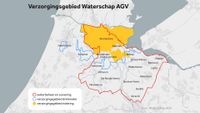
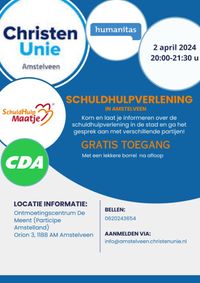
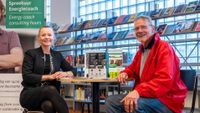
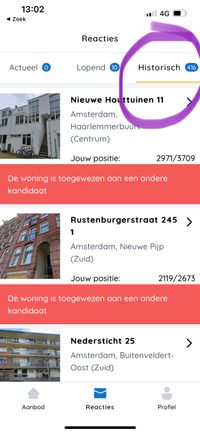

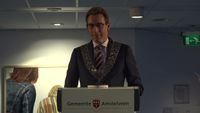

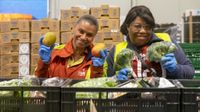


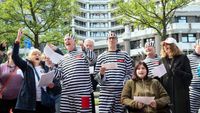

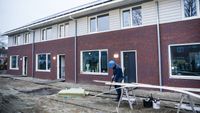
.jpg/picture-200?_=187fbc9a930)
